#'The result [of my work] has been the development and continued growth of one of the most open inclusive...
Explore tagged Tumblr posts
Text
so my boss nominated me for this campus-wide award and gave me their nomination letter today and i cant stop crying. ive been working so fucking hard this past year and seeing that recognized in writing means more than i could have ever anticipated and im so fucking grateful and am feeling very proud of my work
#the awards ceremony is in a couple weeks so who knows who will win#but just the fact that i was nominated for a 'legacy award' due to my work.... god.#like wow.#'How is this for a legacy - a whole radio station? That is the legacy that [I] will leave [my school]#when [I] graduate this summer.' is literally the opener to the nomination#but the line that really got me was#'The result [of my work] has been the development and continued growth of one of the most open inclusive...#...and embracing-of-differences organization [my boss] has ever witness at [my university]'#im genuinely typing this in my office while im crying#that just means so fucking much to me#tree talks
5 notes
·
View notes
Text
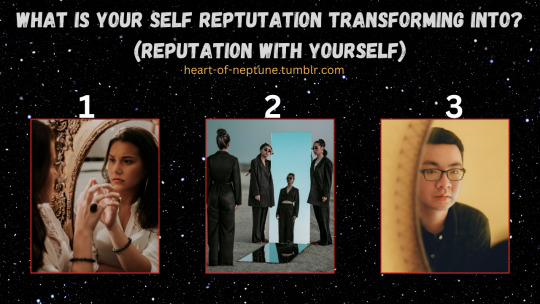
What is your self reputation transforming into? (your reputation with yourself)
We know the vibes here, this is for fun, growth, and self-exploration. It is not meant to be taken seriously unless you want it to. Go into all my readings with an open mind. If you would like one about your reputation with others, please let me know.
Pile 1:
Your reputation with yourself is currently being transformed into someone who is seen as more of a leader. There are so many cards that point to leadership. It seems that you’ve always been a leader but never saw yourself as such. You are embracing this energy now and seeing yourself for who you truly are. You are your own hero. You are finally seeing your power and are feeling more confident in it. You are seeing that you are more confident than you once thought. The way you see yourself is DRASTICALLY changing. This is an extremely deep and powerful reading. I am actually feeling emotional because I feel this deep sense of relief and joy.
All the things that held you back before, weren’t a reflection of you but a reflection of things people have either said or done to you. It feels as if you’ve dropped the weight of what everyone expected of you and embraced your true nature. You finally SEE yourself. Whatever shame, guilt, trauma, or pain that was once blinding you has officially dissipated. You finally feel completely healed after what feels like years or even lifetimes of struggles. It’s this deep feeling of “I can finally see. I finally see myself. I finally see my path. I finally see who I truly am. I was always right about who I am.” You are seeing your greatness in HD quality. It’s crisp and clean. You see every detail of yourself and you are loving all of you right now. Your sense of self respect has increased tremendously. You respect your own ability to walk away from things that are not good for you long term. I see you even finding yourself attractive and seductive. You’re even romancing yourself & flirting with yourself now because you can see your true worth now. A LOT OF SELF LOVE VIBES. You have learned to love how patient you are with yourself and your creations. Something has deeply changed within you for real. I believe this is why this leadership energy is showing up so much. You loved yourself so much to the point where you are leading yourself and that has changed how you view yourself. Since embracing this leadership energy, you trust yourself more than you ever have before. Honestly, this is a beautiful reading. I am so happy for you. Whatever you’ve been doing and taking your time with has definitely been working. You’re going to be seeing more results of this as you continue to focus on yourself. Excellent job! Your entire self reputation has improved massively since you started your self-development journey. I am proud of you and you should definitely feel proud of yourself too!
Pile 2:
Your self reputation is transforming into someone who is seen as independent. You’ve always known you were independent but you’re in a place of embracing your independence more. You’ve either went from being someone who is codependent into someone who is now independent or, you’ve always been independent because you had to or both honestly because there are different aspects of life. So, you went from being codependent in certain aspects of your life to now being fully independent in all aspects of your life. This is a good thing. This makes you feel more confident in yourself. You could be an orphan (either literally or figuratively) meaning you had to do things alone which shaped you into an independent person. Even if you have parents or guardians, they may have not been involved in your development hence this independent energy. You probably have never acknowledged your independence before because you have been like this for so long that it is your natural way of being. Seeing this part of you has made you realize that you are different from most people because of how much you rely on yourself. You’ve had to be strong alone for a very long time. Realizing this has made you gain more respect for yourself and give yourself a pat on the back for how far you’ve come.You understand that you cannot do everything on your own and you’ve learned to ask for help. You are a stoic and assertive person. You have needs and you’ve learned to speak up from a young age to get those needs met. I see that you enjoy silence & that it is in silence you find your power. Silence helps you to properly process whatever is going on in and around you. You’re not someone who is afraid of change anymore. In fact, you embrace it knowing that change is the only way to move forward in life. You see the symbolism in everything that happens in your life thanks to your keen eye and ability to express yourself clearly. You have a BIG personality that not many people get to see. You’re an extremely patient person now. You may have been impatient in the past. That is no longer the case. I see that you thrive with companionship and commitment as long as it is with the right people. This is due to you being able to process things and express yourself clearly. Your independence has made you the ideal friend/partner to yourself which in turn makes you ideal for healthy relationships. I have respect for you as well. You are a force to be reckoned with. Your independence is your power.
Pile 3:
Your self reputation is transforming into someone who is more active. Before you may have been someone who was lazy or someone who didn’t get much done. Now, you’re becoming someone who takes action and is active when it comes to what it is you want. You may also start to work out more. You’re actively taking all the steps needed in order to manifest what it is that you want to see in your reality. You’re being more grounded in your creation process. I see you becoming someone who embraces the magic within you. You’re becoming someone who is way more elegant and mature than you used to be. You may have been awkward in the past however that is changing or has changed completely. You’re seeing the mature version of you now and that’s making you more attractive to yourself. You’re embracing detachment and change & allowing yourself to let go of all the things that truly do not align with your goals and plans. This is making you more detached from the physical reality in a positive way. There is so much emotional maturity coming through for you. Big on “you’ve really grown up.” You’re really seeing yourself in such a wonderful light right now. You’ve completely released the victim mentality and said “I will not let emotions or the past control me anymore.” Good for you. I am proud of you. You still allow yourself to feel however you never let yourself stay in energy that will stagnate you. You’ve come very far in the way that you process the things happening around you and within you. You’re handling everything in your life with an extreme amount of grace and elegance now. It’s truly a sight to behold. Honestly, it’s really looking as if you’ve completely let go of the past and that’s why you’re in this new energy. Nothing from your past is holding you back anymore. You’re in a completely new life and it’s truly changed the way you see yourself. I see you standing in your power more than ever. Passionate, grounded, detached, and completely in control. You’ve become the person you’ve always wanted to be. You are seeing yourself as a success due to this. You will continue to be learning more about the new you and you are happy about this. Great job!
#pick a number#pick a photo#pick a picture#pick a pile#tarot#tarot reading#pick a card#pick an image#self reputation#reputation#self development
298 notes
·
View notes
Text
**** Spoilers for TUA S4 ****
My frustration with the Lila/5 plot in S4 is that they had such a complex and layered relationship already, developed across S2+3 and which truly felt earned by the time we rejoin them in S4. Why would you ruin that by introducing romance?
Lila and 5 have always had a fascinating relationship, mirroring one another and matching one another in a way no other character’s can.
Lila is the only other character to have lived, worked in and experienced the Commission and to therefore know how 5 thinks and operates because of it. Similarity 5 was also once the tool of the Handler, used to do her dirty work and to be wielded against her enemies for her own interests. Lila was in many ways 5’s replacement; the Handler decided to raise her from a child so she would be more malleable and easy to groom in comparison to 5 who was a grown man with trauma from decades of isolation when she recruited him.
Even in this they are mirrored: 5 would definitely see similarities in the Handlers parental manipulation to Sir Reginald’s brand of parenting. Both parents out for their own interests and keen to have superpowered children to deploy as and when they wish.
In S2 once both of them are aware who the other is and how powerful they are, their interactions show their balanced nature. They meet one another punch for punch, witty quip for witty quip. Lila’s powered aids in this as she is literally using 5’s own ability to fight him: visually they are mirrors of one another through that fight scene, through to the end of the season. Lila is the only character we’ve seen able to fight 5 to a standstill for any period of time.
Then throughout S3 we see their relationship develop from grudging acceptance via the proxy of Diageo (she’s my brothers girlfriend vs he’s my boyfriends brother) to actual reliance upon one another. By the end of S4 they acknowledge and appreciate one another’s strengths and truly feel like sibilings in their bantering and teasing relationship. 5 actually calls her family, and Lila’s behaviour towards him becomes familial: ruffling hair, teasing, dancing alongside them all.
There would have been such opportunity for more growth in the subway if they kept it platonic.
Let’s dive into 5’s trauma-bonding to Delores due to lack of human contact; Lila takes up drawing and paints a mural of Diageo and her children, which she talks to every evening. It starts as something funny and to poke fun at their situation but she confesses to 5 that she’s actually come to rely on it, imagining their responses to her questions and guessing what their life has been without her. 5 has the opportunity to be honest about Delores and his love for her; he knows she’s a manaquin but
Have them bond over abusive narcissistic parents: Sir Reginald and the Chairwoman had a lot in common, how is Lila dealing with that as a mother now herself? They grew up running training drills and completing missions: stuck on their own they probably would create obstical courses of doom and fight one another for first place.
Let’s fucking talk about 5’s clear trauma from his first isolation: the poor guy was alone for 40 years with no one, and as a result he put his sibling bond upon a pedestal and risked everything to save their lives. This continues through multiple timelines and in the face of all their shenanigans, even when they are foiling his own plans; through it all 5 will defend his siblings at the expense of anything and everything else. This trauma-bonding to his siblings, when he’s been separated from them for twice as long as he was with them, shows the lasting impact of this isolation on his ability to form relationships or let relationships end. Now he’s once again separated from them; he’s probably going to be bouncing off of the walls about that, and it would be fun to watch.
Plus being on his own again?! Let’s have 5 rage at Lila about it, break down and despair over having to do this all over again. This time he has Lila to talk to but he’s still trapped in a version of his own personal nightmare. The whole attempt to save his family must feel completely useless because here is is again, at the end of the world, alone and without his family.
The plot wouldn’t have had to be changed much at all and we would have gotten fantastic character exploration, and more of the sibling bonding moments that are so key to carrying the show through its more ridiculous or fantastical moments.
On top of all of this one of the key characteristics of 5 and one of his main motivations is his love for his family and his need to protect them. He’s lied, betrayed and murdered people in cold blood all in the name of familial love. Why *on earth* would a character with that history ever consider a romance with his brothers wife and the mother of his brothers children?! Are they trying to argue that if Sloan has been able to come with them after the reset and it was her who was trapped with 5 for all those years, then he would have started something with her too? That goes against a core tenant of his character and is a bridge he just wouldn’t cross no matter how alone he felt.
And why does this character just *have* to have a romantic love plot when their entire character arc across 4 seasons has been about their devotion? Whether devoted to their siblings or their ‘manaquin-love’ coping mechanism, 5’s actions have always been to protect the people he loves.
Calling any of these characters stories lacking because the love wasn’t romantic shows how little the writers understand their own story. Nothing felt missing or absent from 5’s character, and their actions have always fit into the wider show narrative that love makes you do crazy things. Whether it’s Alison’s devolution to Claire, Sir Reginald’s devotion to Alyssa, of 5’s devotion for Delores The Umbrella Academy is united and driven by love.
#the umbrella academy#tua s4#tua#tua spoilers#spoilers#five hargreeves#lila hargreeves#what the hell was that curveball?!#and this isn’t even getting into their weird age gaps#like canonically they met when Lila was a child#and then again when five was 13#and Lila was is sister-in-law from 13-19#and now five is 19-ish and Lila is 35-ish#non romantic relationships#platonic love
23 notes
·
View notes
Text
Compilation of translation snippets I did about interviews published on kiss&cry magazine vol.49, all about Shoma and One Piece on Ice (also posted on twt and here as backup)
Keiji and Koshiro on Shoma:
Keiji: Shoma isn't really Luffy's type, but you can tell that he's trying his best to become Luffy, and that he's enjoying it. He is absorbing more and more and trying to overcome the "wall" of doing moves that he has never done before, moves that are unlike him. When I see that, it makes me want to work even harder.
Koshiro: at the beginning I couldn't imagine Shoma doing Luffy's "full of energy!” movements, so I was like "Do your best (laugh)”, but during rehearsals there were many scenes where I thought, "Oh, it's Luffy! (laugh). I am sure that everyone will be satisfied with Luffy. There are music, dialogue, and people other than himself, so timing is important, but he writes down the flow in his notebook and reviews it. He is taking Luffy really seriously.”
Do you feel any change in Uno since the rehearsals for "One Piece on Ice" started?
Keiji: "Yes, I feel it, he seems to be enjoying it. I think things are going to get harder from now on, but one of the things I'm looking forward to is seeing how Shoma changes as a result of that. I want to be by his side to support him, because he is under the heaviest pressure as the leader.
Shoma’s interview:
How did you feel when you were offered the role?
I have performed to music before, but I’ve never played a story or a character, so at first I thought, "Am I really the right person for this? I was puzzled, but I was happy that they chose me out of so many people. Now that I've been given the job, I will continue to search for what I can do to make it as great as possible, and I will give it my all.
How long did it take you from the time you were offered to the time you decided to appear in the show?
I didn't need think about it for very long. I'm relatively good at figure skating as a sport, as an athlete, and I think I'm doing a good job at it, but I think I'm far from the ideal figure skater that everyone has in their mind. Of course, figure skating is fascinating as a sport in itself, but I think one of its charms is that you focus on one skater and watch their performance and growth, which in a sense is like treating them like idols. I am not good at that part, so I don't know what kind of figure skater I will be when I leave competition someday. I hope that the experience I will gain from One Piece on Ice will give me a clue about that.
Did you get that idea from winning the World Championships for the second time?
There are many reasons, but I think that is one of them. I used to compete with my eyes fixed on the ‘top’, but now that I've achieved results, I asked myself, "What do I want to do next?”, and I thought that I wanted to embody more strongly the charm of figure skating. I have been able to do things my own way in both competitions and ice shows, and that will never change, but I've also started to think that I want to show the audience what they want to see. One Piece on Ice is a show in which I play a character that I’ve never played before, and that’s a new challenge for me. I would like to develop my ability of expression, where I feel I am lacking the most.
Do you feel more "excited" or "pressured" in anticipation of this new challenge?
I would say it's 6:4 in favor of anxiety (bitter smile). Of course I am very much looking forward to it, but I am not sure how much of my accumulated experience I will be able to put to use. I think that because fans love "ONE PIECE" so much, they will look at it more harshly than non-fans when it is adapted into something other than a manga or anime. I am a fan myself, so I understand how they feel. I know I can't satisfy all of them, but I still hope that I can show them something as good as possible.
In "ONE PIECE ON ICE", the " Alabasta Arc" will be depicted. Do you have a favorite scene?
I have read the Alabasta Arc many times. I think my favorite scene is the story of Crocodile and Bibi, and my favorite part of the story is when Bibi faces various conflicts and stands up to protect what he wants to protect with a strong heart. It makes me think about a lot of things."
Your rinkmate from Champéry, Switzerland, Koshiro Shimada, plays the role of Sanji. Have you talked to him about being cast in the show?
I was really happy he was cast. I think Koshiro likes "One Piece" the most out of all the skaters, and back when the rest of the cast had not yet been decided, I had hoped that he would be cast, so I was happy when he was chosen to play the role. He has very long legs just like Sanji. Koshiro also said, "For the first time, I appreciated the length of my legs" (Laughs). I believe that Koshiro-kun is good at playing characters, so I am not worried about anything.
What do you think you and Luffy have in common?
I am not the kind of person who can make people smile like Luffy, so our personalities are far apart. The only thing we have in common is that we both like meat (laughs).
I thought that Luffy's proactive attitude toward difficulties seems to overlap with yours.
I think that a life without difficulties would be boring. In order to get something that you think is unattainable you have to practice a lot, and then you finally get it, and that's when you feel happy and satisfied, I think. So, I am forcing myself to say this, but I would be happy if I could compare myself with Luffy in that way.
You mentioned that in your figure skating programs, you express the melody or sound itself, not the story behind the music. This time, you will be playing a character in a story with a plot, how do you approach it?
I've never really done this before... Fortunately, it's a work that I know well and love, but I'm not sure how I'll be able to express myself in it... I don't know. I think my job will be to take the intentions of the director, Ms. Kahori Kanaya, and the choreographer, Mr. Kenji Miyamoto, and see how faithfully I can reproduce them. I can't see the whole picture yet, but I will just give it my all and do my best.
Knowing there will be many people who don't usually watch figure skating, what do you want to convey to them?
"I think it is important to reproduce the ideal of Mr. Kahori and Mr. Kenji, in terms of the distinctive appeal of figure skating. I hope to be able to show no less than what they envisioned, but it's really unknown.... First of all, I would like to concentrate on the daily training in front of me.
Thank you very much. Finally, do you have a message for the fans who are going to see "One Piece on Ice"?
I don't know how I will be feeling right before the show, but I may be more nervous than at the Olympics or the World Championships (laugh). Because this is something I don't usually do, I am sure I will feel things like anxiety and impatience, but I hope that I will be able to feel a sense of accomplishment as I take on this challenge with all my might. And on top of that, I would like to polish my expressiveness. think this will be a new challenge for all the performers. I hope we can all work together to create a good show, so please come and see it."
from Kenji Miyamoto’s interview:
How do you work on the choreography?
I listen to the scene Kanaya-san [t/n: the director] wants to create, think about how to incorporate it into the skating on the spot, and improvise the choreography. If there is a difference from Kanaya's image, she will politely explain to me that she wants me to reduce the speed more, or that her image of the emotion is different, so she is very helpful.
Shoma Uno plays the main character, Luffy. What do you see as the similarities between the two of them?
"Maybe that he walks in a straight line towards the goal. He doesn't give up, doesn't compromise, keeps his eyes on one point and pushes forward. This is my impression of Shoma's usual practice, and I think the same can be said for Luffy.
How is Shoma Uno doing?
He is trying his best. From the choreography on the ground (off-ice?), he is moving his body as hard as he can, almost to the point of falling down, as if he were trying to reach his limit. I also feel that his facial expressions are becoming more expressive, so I am looking forward to seeing his growth in the future.
I watched the rehearsal of the "rebel dance scene". What did you pay attention to?
“It's a choreography full of speed that conveys the sense of dynamism that is unique to skating. Also, the rebels led by Koza share the same anger, so I was particular about expressing that they seem to be moving separately, but on the other hand, they are somehow in sync with each other. We also expressed the battle scene and the emotions of the characters in the center of gravity shift and edge work of the skating.
#shoma uno#figure skating#one piece on ice#one piece on ice 2023#koshiro shimada#keiji tanaka#kenji miyamoto#shoma seems to be thriving with opoi#love that for him#my translation
81 notes
·
View notes
Text
What to leave behind and what to bring into the new month

Happy last week of January! Pick a group for insights on what you should leave behind as the month ends and what you can focus on in the new month ahead. Let me know if you have any topics you'd like me to pull for!
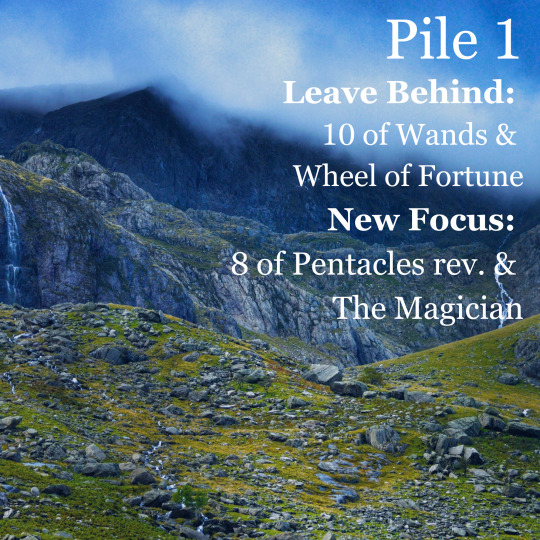
My dear pile one,
It is time to let go of your need to do everything on your own. If you’re feeling overwhelmed or weighed down by your responsibilities – or what you think is your responsibility – try remembering that you’re not alone and there are people here to help carry the load. Allow others to help, even in small ways.
Personal growth and development may be a great focus point for you in the upcoming month. The Magician brings forth the tools and energy you need to make progress in this personal journey. Focus on your “why” and look inward at your power. This period of growth will last you throughout (and beyond) the month, so don’t get hard on yourself if you don’t see immediate results. Growth is not linear.

Hello lovely twos,
Rather than the Tower representing a destruction that has already happened/is currently happening, I think you’re being told to leave January with a bang (semi-literally), and create the destruction of your self-limiting beliefs. Light up some sticks of dynamite, rev up the bulldozer, or get that wrecking ball swinging cause we’re not going into the new month with any of our same thoughts. Your self-limiting beliefs have felt like a chaos storm in your brain, and this is your permission to let them go.
February is a month of self-exploration. It is a month to figure out why these self-limiting beliefs exist. This may be a good time to do some shadow work. Shadow work is tough, but I think some good realizations can come out of it. Here are some shadow work prompts if you’re ready to get started. You may find truths you didn’t know existed. Or you may find yourself answering just as you’d expect, but this time… it’s gonna hit different. You’re going to find answers for yourself which will put a lot into perspective and really help with letting go of your self-doubt.
For those who aren’t ready to dive deep into the darker parts of your soul (which is A-OK!), take a look at the resources at your fingertips. How can you align these resources with your goals? For example, do you have a goal to say nicer things to yourself each day? Make yourself a daily check list – add some normal items like “1 hour with no screen time” or “brush your teeth” and then add “say one good thing about yourself”. As you check of the easier items, you’ll see the tougher ones. And in an effort to make those check marks, you’ll get in the groove of participating in the hard tasks.
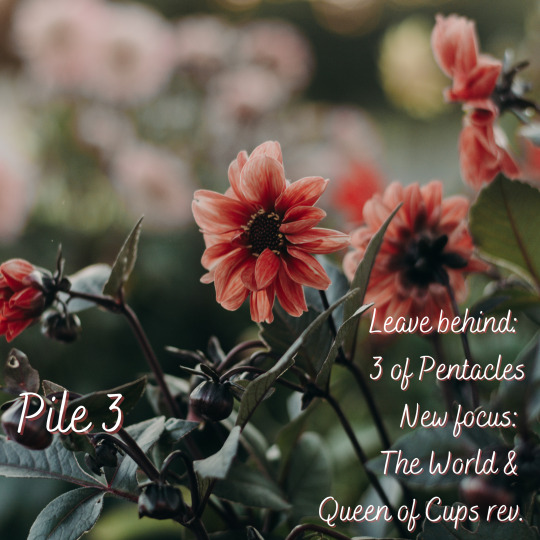
My pile three friends,
Teamwork and collaboration seems to have been a theme in January. Whether it be your new years resolution, a project at work, or homing in on a new habit, the foundation was set in this last month. I wouldn’t say you’re really leaving anything behind, but the creation stage is ending. You are moving forward into the stabilization and growth phases of this beautiful thing you’ve launched.
Bring this sense of accomplishment into February with you to start the month off strong. You’ve done really great work! One great way to keep momentum is a partnership between your higher self and the work you are doing. As you continue to build on the project you started think: what can I get out of this project personally and what can I bring to this project to ensure it thrives. You will feel better about the end results knowing that it made your heart happy and that you had something to do with its success.

To my pile fours,
You know what your higher self is trying to tell you. You know what your guides are hinting at. Maybe it seems too good to be true or it’s scary, but either way, you gotta get rid of the clouds you’re using as a way to doubt yourself. I know from experience that self-doubt speaks LOUD. It is MEAN. But it is soo worth getting past. It doesn’t mean it’ll go away for forever, but it sure can get quieter.
In this situation, “clarity” can be seen as the opposite of “cloudy” , and mental clarity is exactly what the King of Swords wants you to bring into/work on in the new month. You may not be ready to jump right into this new thing in February, but you can do the work this month to feel more confident when the time officially comes. Lay out the facts for yourself: I have done hard things in the past; I have the resources I need to be successful; I have people I know will support me when it gets difficult. And repeat these facts to yourself as much as you need to. As with pile two, you could do some shadow work to bring clarity to why you feel this hesitancy to move forward.
#new month new goals#bye bye january#hello february#tarot reading#tarot#pick a card#ten of wands#wheel of fortune tarot#eight of pentacles#the magician tarot#the tower tarot#eight of wands#justice tarot#three of pentacles#the world tarot#queen of cups#ace of swords#judgement tarot#king of swords
40 notes
·
View notes
Text
ReoNagi/NagiReo shower thoughts: a short essay
[manga spoilers ahead, the usual]
Disclaimer: These are just my own opinions on the ship.
The ReoNagi ship at its foundation is actually a "marriage of convenience/fwb-to-lovers" trope, if you think about it...
Or rather, it's the equivalent exchange meme: Reo gets to utilize Nagi's football skills and Nagi gets a convenient life with someone taking care of all his needs.
Although Nagi realises pretty early on how Reo essentially manipulates others around him to reach his goals (even back in school), and likely himself as well, but he lets himself get manipulated.
(It's shown in episode Nagi that Reo utilized methods like that "3rd meal trading" to maintain the harmony in Team V, to avoid turning out like Barou's team).
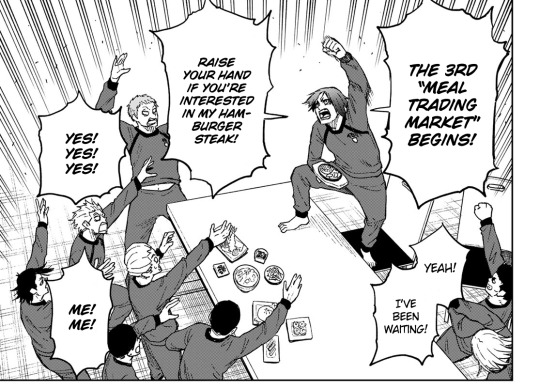
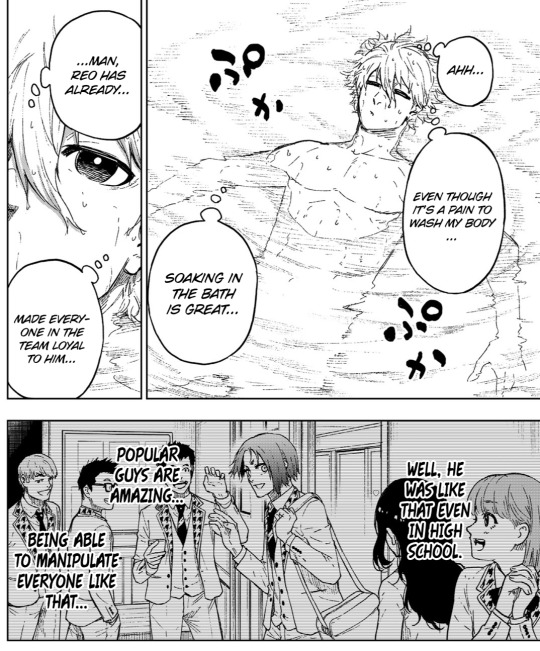
Or rather, allows himself to be manipulated because it benefits him in the end too, anyway: it's a somewhat mutually beneficial relationship playing to both of their individual strengths.
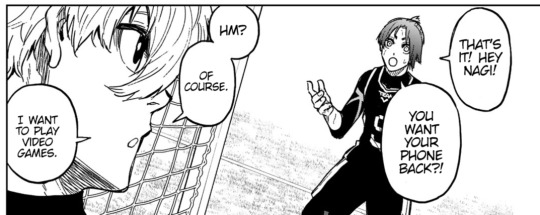
Though on Nagis end it may also have something to do with what Nagi says about Reo being the only person to be interested in "a slacker like me".
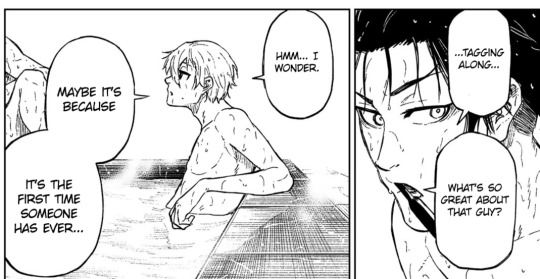
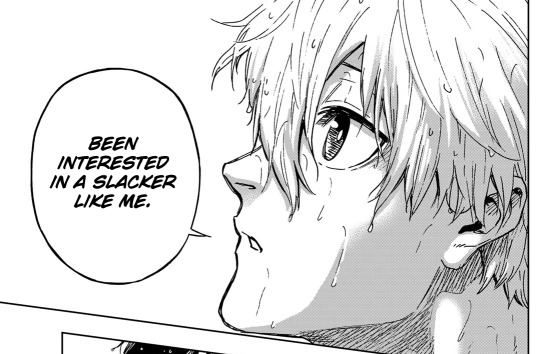
Whereas on Reo's end, given how he says everything back in the Mikage corporation is boring, and the way he latches onto Nagi, calling him his treasure, I'd say that Nagi probably symbolises his goal. Attaining something that can't be bought with money. Something beyond even the Mikage corporation.
Of course, their relationship evolves over the course of blue lock, in the sense that Reo is content with what they have, is alright with continuing as they are, but Nagi is partially influenced/caught up in the competitiveness of their environment and knows that he can play at a higher level, so he chooses to leave Reo.
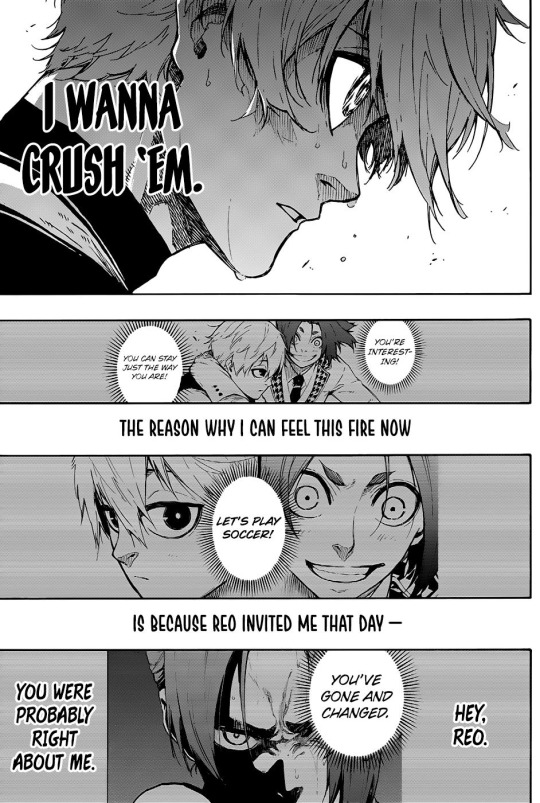
Even though he's breaking their promise of staying together till the end, from his point of view, his growth also benefits Reo in the end, so he chooses that path. Nagi is more practical than emotional, and probably decided that the end result is worth it.
And this choice shakes up their relationship, of course. Like I've mentioned in this post: the miscommunication troupe is the very core of their relationship.
Because their relationship is also relatively new, no matter how well they work together. They've only been playing football together for about six months, of course Reo doesn't understand why Nagi would up and leave, because the other didn't tell him, and Nagi assumes that Reo understands his actions.
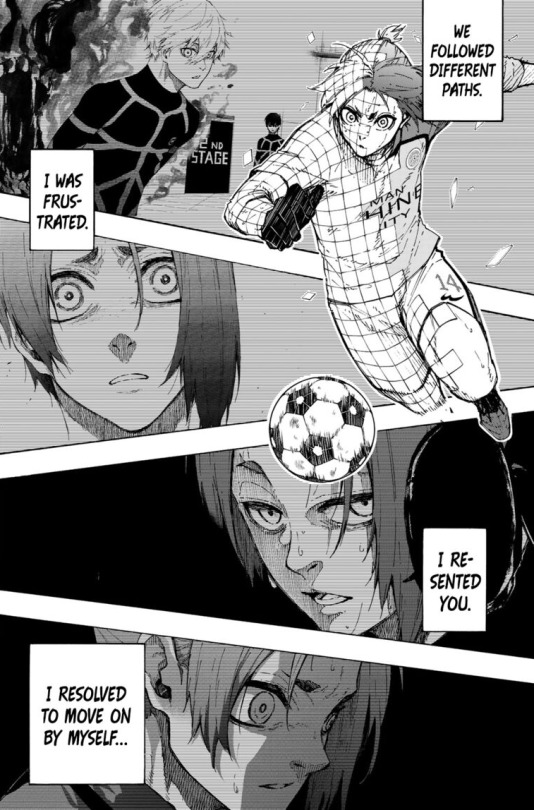
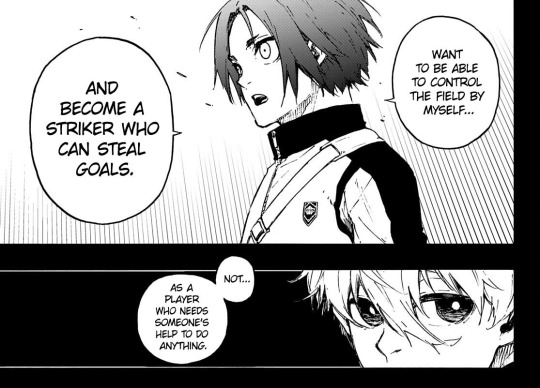
And suddenly their relationship is not so mutually beneficial anymore: Reo thinks that Nagi has abandoned him, so he avoids him, and Nagi doesn't have anyone fussing over him anymore.
Reo gets messed up by the emotional whiplash of his best friend leaving him and calling him a pain in the ass (derogatory), and Nagi has to look after himself.
Essentially, they're learning how to be less codependent on each other. Reo in the emotional sense, and Nagi in the practical sense of it all. Because Reo was kind of putting all his eggs in one basket (basket being Nagi here), who doesn't realise the weight he was holding.
Then Nagi throws a reverse-uno and asks Reo for his help in football. Kind of like a full-circle moment, also seems like Nagi's way of holding out an olive branch.
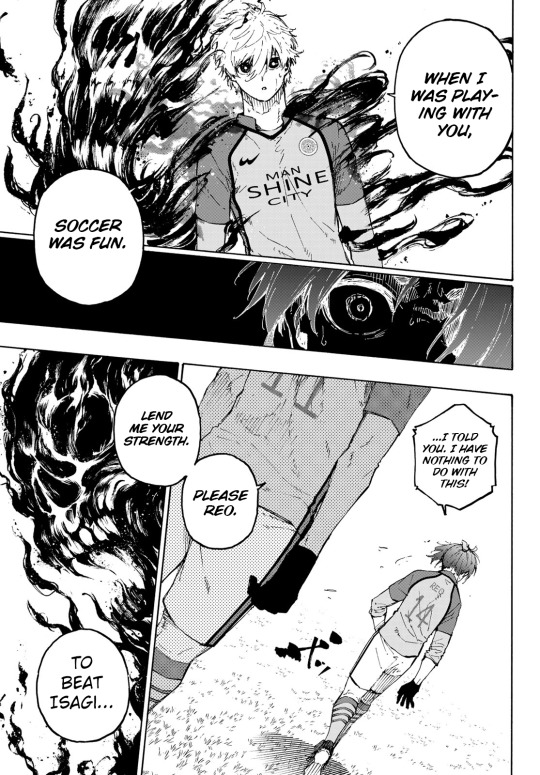
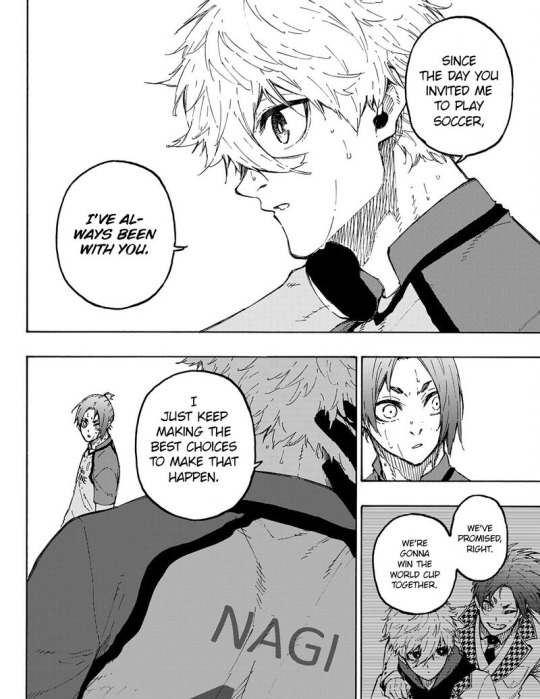
Though the above panels do show that
Nagi and Reo's goals are still unaligned
While Reo's goals shifted slightly from "winning the world cup" to "making Nagi the best in the world", Nagi's always been going along with Reos whims, and only just started thinking for himself.
In chapter 207 Nagi says he's been playing so far with the goal of "beating Isagi", he doesn't really have the ambition to be the "world's #1", keeping with his consistent theme of just wanting to slack.
And it's obvious that they both want to fall back to their old dynamics (a safety net), but they've both changed: Nagi has somewhat developed his "ego", and a hunger to defeat others, Reo has learnt how to fight by himself (though he doesn't want to). Thus their dynamics would inevitably change, too.
So this begs the question: are they still "mutually beneficial"? Do they have to be to maintain their relationship?
(Though it's my hope that Reo understands where Nagi is coming from now after that exchange they had on the field. I'm not as confident in Nagi understanding Reo's outburst, but. Maybe him thanking Reo for introducing him to football is a start).
#episode nagi#blue lock#bllk#reonagi#nagi seishiro#reo mikage#nagireo#spoilers#tbh early stages reonagi is like a marriage of convenience thing#now that i think about it#fr i hope they talk tho#reonagi analysis#reonagi brainrot hours
75 notes
·
View notes
Text
Rediscovering My ENFP Self: The Campaigner Within

As part of a class activity, we were asked to take the 16 Personalities test. It had been years since I last did this, back when I was 20. I was curious to see how much I’d changed. After all, I’ve grown a lot since then — my style, my energy, and even the people I keep close to have all shifted.
But when I saw the result, it turned out I’m still the same: an ENFP, the Campaigner.
At first, I was surprised. With all the changes in my life, I thought my personality might have evolved into something different. But the more I read about what it means to be an ENFP, the more I realized that this is still me.
The Campaigner in Me
Being an ENFP means I’m driven by enthusiasm, creativity, and idealism — qualities that have stayed with me through the years, even if they’ve taken on new forms. My mind still buzzes with ideas and possibilities. I still find myself excited at the thought of exploring new experiences and perspectives. It’s like my curiosity has no off switch, and honestly, I wouldn’t have it any other way.
I’ve always approached life with an energy that can’t help but spill over to those around me. Whether it’s starting a conversation with a stranger or diving headfirst into a new project, I’ve learned that this charisma and openness are what connect me with others.
But the part of being an ENFP that resonates most is the idea of being a dreamer with a mission. I’m not just here to imagine the possibilities — I want to make things better, to turn those dreams into realities. That drive hasn’t gone away, even as my circle has gotten smaller and my focus sharper.

Growth and Staying True to Myself
This experience reminded me of something important: growth doesn’t erase who you are — it refines it. Yes, I’ve changed in how I present myself, how I conserve my energy, and how I choose my people. But at my core, I’m still the same person who dreams big, romanticizes life, and finds joy in connecting with the world around me.
Life is a constant journey of learning and evolving, but this result showed me that no matter how much I grow, the essence of who I am remains intact. I’m still that vibrant, curious soul who believes in the beauty of possibilities.
So here’s to being an ENFP — a Campaigner. To dreaming, exploring, and striving to make the world a better place, one step at a time.
Exploring My Innovation Mindset: A Journey of Growth
I took an innovation mindset test that offered insights into how I approach innovation and entrepreneurship. At first, I thought it would just be a simple evaluation, but as I read through the results, I realized how much it reflected my personal and professional growth—and how much room I still have to evolve.
One of the key takeaways from the test was this: my innovation mindset isn’t fixed. It’s something I can develop and expand in any area I choose. That idea alone was both empowering and exciting because it reminded me that growth is always possible.

What These Results Mean to Me
Taking this test was a powerful reminder that innovation isn’t just about creativity — it’s about mindset. It’s about being resilient in the face of setbacks, open to new perspectives, and willing to step out of your comfort zone.
But more than that, it showed me where I have room to grow. For example, building stronger trust and collaboration skills could help me connect more deeply with others and create more impactful ideas.

A Mindset in Progress
Ultimately, this test taught me that innovation isn’t a fixed trait or a destination — it’s a journey. Each component of my mindset is an opportunity for growth, and I’m excited to work on these areas as I continue to evolve.
So here’s to embracing the process, learning from every challenge, and staying curious about what’s possible. Because no matter where I am today, there’s always room to innovate tomorrow.
2 notes
·
View notes
Text

You have no idea how lucky you’re going to get. We are the only ones who showed up at the office for an in-person meeting. Circling each other for months, I have been waiting for this opportunity to let my desires be known. I’m wearing a business casual, checkered jacket, buttoned up as proper attire and disguising my shirtless state beneath. I sit across from you, chatting about details of a recent project. We’re already friendly and at ease with each other as we spar verbally… verging on affectionate teasing. You hear the pings from others logging into the Zoom room and attend to their entry. I disable my video with apologies to the attendees about my bandwidth limitations… and wink at you. Greetings and formalities are dealt with, and you ask for reports, still oblivious to my intentions. I volunteer to talk the others thru the slide deck we worked on together, while you commandeer the controls. As you share your screen, I unbutton my jacket… then slowly reveal my nudity for your eyes only. They widen and soften as the abundance of my breasts come into view and I let my fingernails graze my soft skin. I lock eyes with you and bite my lip… even as I describe the new product we’re bringing to market.
“Next slide…”
I make points about the advantages we’ll be able to take over our peers in the industry. Pulling one lapel aside, I cradle the plump flesh of the exposed globe and manipulate its heft and shape, while you lick your lips until I suggest
“Next slide…”
Narrating the animated chart, I speak of the touch points for rapid response as I roll my swollen nipple between my thumb and index finger. Adding there is much to be gained by tweaking these weaknesses for greater dominance over our internal systems. My eyes roll with pleasure as I work one, then tug the other lapel to offer the same treatment as I continue with the first.
“Next slide…”
More revenue and profit figures flash on the screen and I profess you would be better to explain the intentions the company has to manipulate this volatile sector. I continue massaging myself as you outline the plans you have waiting in the wings for an upstream shift in funding growth. Mesmerized by my movements, you mention how exciting it is to monitor the quicksilver changes on both sides. You stand to show me the bulge in your trousers as you stroke its length. When I wet my fingers past my trembling lips and then seductively drag them to the wet space between my thighs, you sit down with a firm grip on yourself.
“Next slide…”
In closing, I claim the slides are available for download and review to give everyone a deeper, more fluid understanding of the input and results looming for a rewarding success and culmination of this fiscal year.
During a Q & A you conduct, I stand to sit atop and pivot to your side of the conference table just off camera. I hike my skirt to my waist to show you the dewey juncture swelling with arousal. A scant lacy garter belt holds my dark stockings and it is more than obvious there are no matching panties… and never were since I arrived for the meeting. The premeditated nature of my exhibition brings a smile to your face as you address a question about unexpected developments that would force an adjustment of strategy. You assure them that the company is nimble and more than ready for all sorts of pivots and penetrations into enticing and emerging entities.
Impatient, I suggest we circle back after absorbing what we’ve seen in today’s meeting and explore the most seductive leads. I guide your free hand between my thighs, and you breech me with your fingertips. My gasp is warning enough to mute yourself, as I devolve into needy moans and squirming enough to threaten the frame of your video feed. You nod in my direction and wave a silent goodbye to the team members as you leave the meeting. Checking that the disconnect is solid, your fingers coax me closer to straddle you, standing. Upon withdrawal you cleanse your fingers thirstily, then dip your tongue to savor the juicing source. My whimpers grow to groans again, when you reveal your own commando mode and I am lowered upon your upright growth. Easing it deep, I am beyond exhilarated by the stretching your throbbing length is supplying, giving you an unending series of murmured feedback.
“Next slide…”
4 notes
·
View notes
Text
Chrysalis: Am I really?
Then Sunrise kissed my Chrysalis— And I stood up—and lived— —Emily Dickinson.
I was three years old when I made the most important psychological discovery of my life. I discovered that a living creature, obeying its own inner laws, moves through cycles of growth, dies, and is reborn as a new creation.
One day I was smoking my corncob bubblepipe helping my father in the garden. I always enjoyed helping him because he understood bugs, and flowers, and where the wind came from. I found a lump stuck to a branch, and Father explained that Catherine Caterpillar had made a chrysalis for herself. We would take it inside and pin it on the kitchen curtain. One day a butterfly would emerge from that lump.
Well, I had seen magic in my father's garden, but this stretched even my imagination. However, we carefully stuck the big pins through the curtain, and every morning I grabbed my doll and pipe and ran downstairs to show them the butterfly. No butterfly! My father said I had to be patient. The chrysalis only looked dead. Remarkable changes were happening inside. A caterpillar's life was very different from a butterfly's, and they needed very different bodies. A caterpillar chewed solid leaves; a butterfly drank liquid nectar. A caterpillar was sexless, almost sightless, and landlocked; a butterfly laid eggs, could see and fly. Most of the caterpillar's organs would dissolve, and those fluids would help the tiny wings, eyes, muscles and brain of the developing butterfly to grow. But that was very hard work, so hard that the creature could accomplish nothing else so long as it was going on. It had to stay in that protective shell.
I waited for that sluggish glutton of a caterpillar to change into a delicate butterfly, but I secretly figured my father had made a mistake. Then one morning my doll and I were eating our shredded wheat when I sensed I was not alone in the kitchen. I stayed still. I felt a presence on the curtain. There it was, its wings still expanding, shimmering with translucent light—an angel who could fly. Its chrysalis was empty. That mystery on the kitchen curtain was my first encounter with death and rebirth.
Years later I discovered that the butterfly is a symbol of the human soul. I also discovered that in its first moments out of the chrysalis the butterfly voids a drop of excreta that has been accumulating during pupation. This drop is frequently red and sometimes voided during first flight. Consequently, a shower of butterflies may produce a shower of blood, a phenomenon that released terror and suspicion in earlier cultures, sometimes resulting in massacres. Symbolically, if we are to release our own butterfly, we too will sacrifice a drop of blood, let the past go and turn to the future.
It is the twilight zone between past and future that is the precarious world of transformation within the chrysalis. Part of us is looking back, yearning for the magic we have lost; part is glad to say goodbye to our chaotic past; part looks ahead with whatever courage we can muster; part is excited by the changing potential; part sits stonestill not daring to look either way. Individuals who consciously accept the chrysalis, whether in analysis or in life's experience, have accepted a life/death paradox, a paradox which returns in a different form at each new spiral of growth. In T.S. Eliot's "Journey of the Magi," one of the kings, having returned to his own
country, describes his experience in Bethlehem:
....so we continued And arrived at evening, not a moment too soon Finding the place; it was (you may say) satisfactory. All this was a long time ago, I remember, And I would do it again, but set down This set down This: were we led all that way for Birth or Death? There was a Birth, certainly, We had evidence and no doubt. I had seen birth and death, But had thought they were different; this Birth was Hard and bitter agony for us, like Death, our death. We returned to our places, these Kingdoms, But no longer at ease here, in the old dispensation, With an alien people clutching their gods. I should be glad of another death.
If we accept this paradox, we are not torn to pieces by what seems to be intolerable contradiction. Birth is the death of the life we have known; death is the birth of the life we have yet to live. We need to hold the tensions and allow our circuit to give way to a larger circumference.
People splayed in a perpetual chrysalis, those who find life "weary, stale, flat and unprofitable"2
or, to use the modern jargon, "boring," are in trouble. Stuck in a state of stasis, they clutch their childhood toys, divorce themselves from the reality of their present circumstances, and sit hoping for some magic that will release them from their pain into a world that is "just and good," a make-believe world of childhood innocence. Fearful of getting out of relationships that are stultifying their growth, fearful of confronting parents, partners or children who are maintaining infantile attitudes, they sink into chronic illness and/or psychic death. Life becomes a network of illusions and lies. Rather than take responsibility for what is happening, rather than accept the challenge of growth, they cling to the rigid framework that they have constructed or that has been assigned to them from birth. They attempt to stay "fixed." Such an attitude is against life, for change is a law of life. To remain fixed is to rot, particularly if it be in the Garden of Eden.
Why are we so afraid of change? Why, when we are so desperate for change, do we become even more desperate when transformation begins? Why do we lose our childhood faith in growing? Why do we cling to old attachments instead of submitting ourselves to new possibilities—to the undiscovered worlds in our own bodies, minds and souls? We plant our fat amaryllis bulb. We water it, give it sunlight, watch the first green shoot, the rapidly growing stock, the buds, and then marvel at the great bell flowers tolling their hallelujahs to the snow outside. Why should we have more faith in an amaryllis bulb than in ourselves? Is it because we know that the amaryllis is living by some inner law—a law that we have lost touch with in ourselves? If we can allow ourselves time to listen to the amaryllis, we can resonate with its silence. We can experience its eternal stillness. We can find ourselves at the heart of the mystery. And in that place, the place of the Goddess, we can accept birth and death. The exquisite blossom will die, but if the bulb is given rest and darkness, another bloom will come next year.
Insecurity lies at the heart of the fear of change. Individuals who recognize their own worth among those they love can leave and return without fear of separation. They know they are valued for themselves. Our computerized society, fascinating and efficient as it is, is making deeper and deeper inroads into genuine human values. A machine, however intricate, has no soul, nor does it move with the rhythms of instinct. A computer may be able to vomit out the facts of my existence, but it cannot fathom the subterranean corridors of my aloneness, nor can it hear my silence, nor can it respond to the shadow that passes over my eyes. It cannot compute the depth and breadth and height of the human soul. When society deliberately programs itself to a set of norms that has very little to do with instinct, love or privacy, then people who set out to become individuals, trusting in the dignity of their own soul and the creativity of their own imagination, have good reason to be afraid. They are outcasts, cut off from society and to a greater or lesser degree from their own instincts. As they work in the silence of their cocoon, they often think they are crazy. They also think they would be crazier if they gave up their faith in their own journey. Like the chrysalis pinned to the kitchen curtain, Blake's proverb is pinned to their study wall: "If a fool would persist in his folly, he would become wise."
Courage to stand alone, to wear the "white plume" of freedom, has been the mark of the hero in any society. Standing alone today demands even more courage and strength than it did in former cultures. From infancy, children have been programmed to perform. Rather than living from their own needs and feelings, they learn to assess situations in order to please others. Without an inner core of certainty grounded in their own musculature, they lack the inner resources to stand alone. Pummelled by mass media and peer group pressures, their identity may be utterly absorbed by collective stereotypes. In the absence of adequate rites of passage, ad[1]men become the high priests of an initiation into the addictions of consumerism. Everywhere the ceremony of innocence is exploited.
Without recognized rites, members of a society are not sure who they are within the structure. Children who have fumbled their way through puberty find themselves in adolescence raging for independence, at the same time furious when asked to take responsibility. Boys who have never been separated from their mothers and are fearful of their fathers cannot make the step into adult manhood. Girls who have lived in the service of their driving masculine energies are not going to forsake their P.P.F.F. (Prestige, Power, Fame and Fortune) for a sense of harmony with the cosmos. Even the rites of marriage are confusing. Unwed couples who have lived together for years may eventually believe that "marriage isn't going to make any difference," and then be genuinely confused when sexual difficulties do develop after the vows are spoken. Arriving at middle age is agony for those who cannot accept the mature beauty of autumn. They see their wrinkles hardening into lines, and new liver spots appearing every day, without the compensating mellowing in their soul. Without the rites of the elders, they cannot look forward to holding a position of honor in their society, nor in most cases will they treasure their own wisdom. For some, even the dignity of death dare not be contemplated.
The undercurrent of despair in our society is epitomized in a German word that first appeared in English in 1963, and is now incorporated into the Oxford English Dictionary (Supplement, 1985). It is torschlusspanik, (pronounced tor¬shluss-panic), defined as "panic at the thought that a door between oneself and life's opportunities has shut." Words enter a language when they are needed, and torschlusspanik has arrived. The doors that were once opened through initiation rites are still crucial thresholds in the human psyche, and when those doors do not open, or when they are not recognized for what they are, life shrinks into a series of rejections fraught with torschlusspanik: the graduation formal to which the girl was not invited; the marriage that did not take place; the baby that was never born; the job that never materialized. Looking back, we recognize that it was often not our choice that determined which door opened and which door shut. We were chosen for this, rejected for that.
Torschlusspanik is now a part of our culture because there are so few rites to which individuals will submit in order to transcend their own selfish drives. Without the broader perspective, they see no meaning in the rejection. The door thuds, leaving them bitter or resigned. If, instead, they could temper themselves to a point of total concentration, a bursting point where they could either pass over or fall back as in a rite of passage, then they could test who they are. Their passion would be spent in an allout positive effort, instead of deteriorating into disillusionment and despair. The terror behind that word torschlusspanik is what drives many people into analysis—the last door has shut, the last rejection has taken place. No door will ever open again. Nothing means anything.
Another reason for fearing the chrysalis lies in our cultural loss of containers. Our society's emphasis on linear growth and achievement alienates us from the cyclic pattern of death and rebirth, so that when we experience ourselves dying, or dream that we are, we fear annihilation. Primitive societies are close enough to the natural cycles of their lives to provide the containers through which the members of the tribe can experience death and rebirth as they pass through the difficult transitions. To quote from the classic Rites of Passage by Arnold van Gannep:
In such societies every change in a person's life involves actions and reactions between sacred and profane—actions and reactions to be regulated and guarded so that society as a whole will suffer no discomfort or injury. Transitions from group to group and from one social situation to the next are looked on as implicit in the very fact of existence, so that a man's life comes to be made up of a succession of stages with similar ends and beginnings: birth, social puberty, marriage, fatherhood, advancement to a higher class, occupational specialization, and death. For every one of these events there are ceremonies whose essential purpose is to enable the individual to pass from one defined position to another which is equally well defined.... In this respect man's life resembles nature, from which neither the individual nor the society stands independent.
Through their initiation, for example, boys are recognized as responsible adult men. They are cut off from their mothers, trained as warriors, instructed in the culture of their tribe.
For girls, the meaning of puberty rites is somewhat different. Here I quote from Bruce Lincoln's Emerging from the Chrysalis:
Rather than changing women's status, initiation changes their fundamental being, addressing ontological concerns rather than hierarchical ones.
A woman does not become more powerful or authoritative, but more creative, more alive, more ontologically real. ... The pattern of female initiation is thus one of growth or magnification, an expansion of powers, capabilities, experiences. This magnification is accomplished by gradually endowing the initiand with symbolic items that make of her woman, and beyond this a cosmic being. These items can be concrete, such as clothing or jewelry, or they can be nonmaterial in nature, such as songs chanted for the woman-to be, myths repeated in her presence, scars or paintings placed upon her body.
The scarification is meant to provide an experience of intense pain and an enduring record of that pain. The person is rendered unique. Through this magnification, the woman "steps into the cosmic arena: she is given the water of life, with which she nourishes the cosmic tree."
Such primitive rituals did not change the way people lived. They gave meaning to life. By means of ritual, relationship to the unchanging, archetypal aspects of existence was affirmed and renewed. What would otherwise have been boring drudgery or torschlusspanik was invested with a meaning that transcended animal survival. Through ritual, human activity was connected to the divine.
In more sophisticated societies, the church and the theater became ritual containers. Within the safety and the confines of the Mass, for instance, the individual could surrender to God and experience dismemberment and death, descent into Hell and resurrection of the spirit on the third day. One could experience the magnification of one's own spirit by experiencing oneself as sacrificer and sacrificed. Like the primitive, the participant left the ritual with enhanced meaning, with a profound sense of belonging to a cosmos and to a community that respected that cosmos.
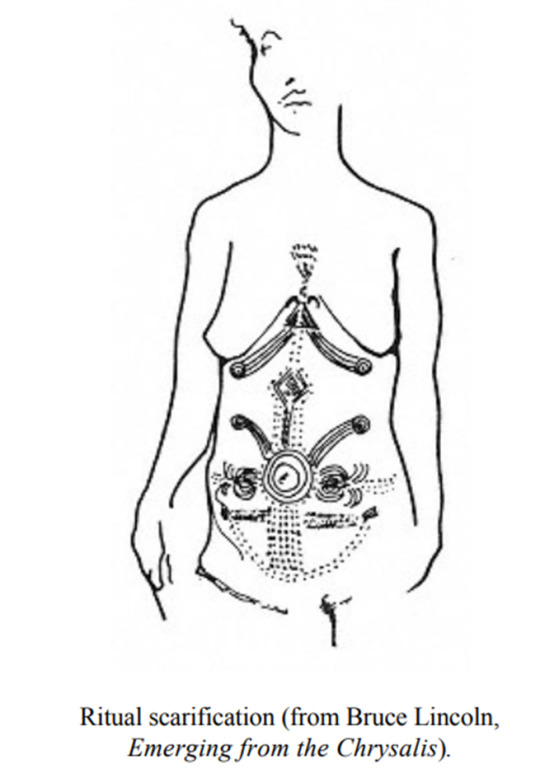
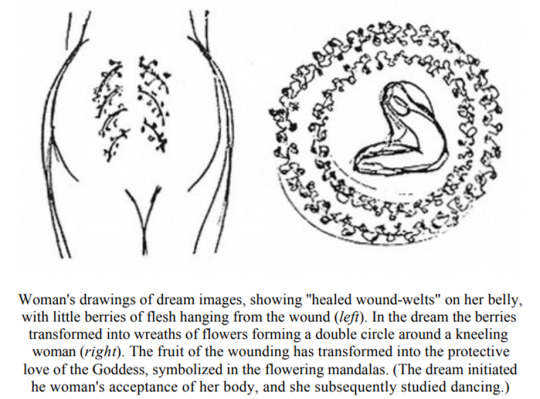
The theater also provided a ritual container, a public chrysalis. The plays dealt with archetypal realities. On the stage, men and women saw their own psychological depths enacted and were thus encouraged to reflect on their own human situation.
We have lost our containers; chaos threatens. Without rituals to make a firm demarcation between the profane and the sacred, between what is us and what is not us, we tend to identify with archetypal patterns of being—hero, Father, Mother, etc. We forget that we are individual human beings; we allow ourselves to be inflated by the power of the unconscious and usurp it for our own. And we do this not knowing what we do and that we do it. Liberated from the "superstitious" belief in gods and demons, we claim for ourselves the power once attributed to them. We do not realize we have usurped or stolen it. How then do we explain our anxiety and dissatisfaction? Power makes us fearful; lack of it makes us anxious. Few are satisfied with what they have. Despite our socalled liberation from gods and demons, few can live without them. Their absence makes nothing better. It may even make everything worse.
If, for example, a child has acted as buffer between his parents, he may fear his home will disintegrate if he ceases to act as intermediary. Without realizing it, he has assumed the power of the savior in his small world. When as an adult his boundaries are widened, he will tend to take on that archetypal role wherever he goes. He will also suffer guilt when he fails. He may even suffer guilt for being unable to make it snow when his family has planned a skiing weekend. Such hubris is seen as ludicrous once it is brought to consciousness, but, without consciousness, depression and despair fester inside. "I should have been able to do something. I failed," Instead of leaving other people's destiny to them and accepting his own, he attempts to take responsibility for Fate and feels inadequate when the door thuds. The resulting guilt can quickly switch to rage, rage that resonates back to the powerless childhood. "What do you expect of me? I can't do it. Get off my back. Carry your own load. LEAVE ME ALONE."
Many people, for example, think life is a meaningless merry-go-round if they are not being transported by love like Prince Charles and Lady Diana, or living for a cause like Mother Theresa, or dying for a dream like Martin Luther King. They measure their standard of behavior by comparison with figures who carry immense archetypal projections—Marilyn Monroe, John F. Kennedy, Michael Jackson. A mask ceases to be a mask. Instead, with the help of dyes and surgery, the mask becomes the face. Cosmetics are identity or character or Fate. By identifying with an archetype instead of remaining detached from it, they turn life into theater and themselves into actors on a stage, thus falling prey to demonic as well as angelic inflation. Without the container, they confuse the sacred and profane worlds.
We are the descendants of Freud and Jung, and while poets and madmen had free access to their unconscious before those two giants, the world of the archetype is now an open market for the general populace without any ritual containment. If we are blindly living out an archetype, we are not containing our own life. We are possessed, and possession acts as a magnet on unconscious people in our environment. Everyday life becomes a dangerous world where illusion and reality can be fatally confused.
A life that is being truly lived is constantly burning away the veils of illusion, gradually revealing the essence of the individual. Psychoanalysis can speed up that process. Sometimes people experience themselves as caterpillars crawling along. Externally, everything seems fine. Some deep intuitive voice, however, may be whispering, "It's not worth it. There's nobody here. I need a cocoon. I need to go back and find myself." Now, they may not quite realize that when caterpillars go into cocoons, they do not emerge as high-class caterpillars, and they may not be prepared for the agony of the transformation that goes on inside the chrysalis. Nor are they quite prepared for the winged beauty that slowly and painfully emerges, that lives by a very different set of laws than a caterpillar. Even more confounding is the fact that friends and relations who may be quite happy caterpillars have no patience with a silent, hard-edged chrysalis that is all turned in on itself—"selfish, lazy, self indulgent." And they have even less patience with a confused butterfly who hasn't adjusted to the laws of aerodynamics.

Still, it is amazing how often other caterpillars, inspired by butterflies, sacrifice their landlubber condition, make their own chrysalis and find their own wings. Jung writes that coming to consciousness is "the sacrifice of the merely natural man, of the unconscious, ingenuous being whose tragic career began with the eating of the apple in Paradise.
The chrysalis is essential if we are to find ourselves. Yet very little in our extroverted society supports introverted withdrawal. We are supposed to be doers, taking care of others, supporting good causes, unselfish, energetic, doing our social duty. If we choose to simply be, our loved ones may automatically assume we are doing nothing, and at first we may feel that way ourselves. We begin to look at our primeval muck as it surfaces in dreams. All hell starts to break loose inside, and we wonder what's the point of dredging up all this stuff. We argue with ourselves: "I should be out there doing something useful. But the truth is I can't do anything useful if there's no I to do it. I can't love anyone else, if there's no I to do the loving. If I don't know myself, I cannot love myself, and if I do not love myself, my love of others is probably my projected need of their acceptance. I am putting on a performance in order to be loved. I fear rejection. If nobody loves me, I won't exist. But who are they loving? Who am I?"
That is what going into the chrysalis is all about—undergoing a metamorphosis in order one day to be able to stand up and say I am. The gnawing hunger, the incessant yearning at the core of many lives, began at birth, or perhaps even in utero. In order to survive in a demanding environment where one or both parents projected their unlived dreams (or nightmares) onto their children, the infants gave up trying to live their own lives. As little human beings with needs and feelings of their own, they were rejected. Their mystery was never considered, and so they grew up automatically thinking in terms of other people's response. In other words, they developed a charming persona, a mask they created with infinite care—a mask that, as adults, may be at once their greatest blessing and greatest curse. Outwardly they may be brilliantly successful, but inwardly empty. They cannot understand why their intimate relationships repeatedly end in disaster, a pattern they recognize but can do nothing to stop. They dream they are actors, the spotlight is on them, but they cannot remember what play they are in, let alone what their lines are. If their ego is barely formed, they may not even appear in their own dreams, or may recognize themselves as objects or little animals.
It is important to point out, however, that we all need several personas, that is, the right mask for the right occasion. Jung was once lecturing on the topic when a student accused him of being hypocritical if he used a persona. Jung said that he had just had a fight with his wife, and he was still angry, but that anger had nothing to do with the students, nor with their reason for getting themselves to the Institute that morning. It was neither fair to himself nor to them to show that anger there. However, he said, he intended to finish the fight when he went home. The point is that we must be conscious enough to know when we are using a persona and for what reason. Otherwise we easily identify with a particular persona, which obliges us to repress our genuine feelings and prevents us from acting on them at the right time and place. The persona is necessary because people at different levels of consciousness respond to a situation with very different antennae. Naively or deliberately, making oneself vulnerable to psychic wounding without good reason is foolish. To be wary of casting pearls before swine is not conceit but plain common sense.
As the transformation process goes on, pregnancies and newborn babies frequently appear in dreams. When the conscious ego is able to release repressed psychic energy, or reconnects with unconscious body energy, or makes a decision on its own behalf, that new energy is symbolized as new life. When the psyche is preparing to move onto a new level of awareness, or one's conscious attitude has made a new connection with the unconscious, then dreams may appear where the dream ego, the shadow or the anima is pregnant. Nine months later, so long as the process has not been aborted, there are often dreams of crossing borders, passing over into a new country, moving through subterranean tunnels or actually giving birth (see below, page 158). If the ego maintains the connection, the newborn child is nurtured with soul food. If the ego falters and fails to act on the new energy, the baby may appear mutilated, starving or dead. Or it may simply disappear.
I have found that individuals tend to repeat the pattern of their own actual birth every time life requires them to move onto a new level of awareness. As they entered the world, so they continue to reenter at each new spiral of growth. If, for example, their birth was straightforward, they tend to handle passovers with courage and natural trust. If their birth was difficult, they become extremely fearful, manifest symptoms of suffocating, become claustrophobic (psychically and physically). If they were premature, they tend to be always a little ahead of themselves. If they were held back, the rebirth process may be very slow. If they were breechbirth, they tend to go through life "assbackwards." If they were born by Caesarian section, they may avoid confrontations. If their mother was heavily drugged, they may come up to the point of passover with lots of energy, then suddenly, for no apparent reason, stop, or move into a regression, and wait for someone else to do something. Often this is the point where addictions reappear—binging, starving, drinking, sleeping, overworking—anything to avoid facing the reality of moving out into a challenging world.
Many delightful babies appear in dreams, and just as many little tyrants who need firm and loving discipline. One child, however, is noticeably different from the others. This is the abandoned one, who may appear in bullrushes, in straw in a barn, in a tree, almost always in some forgotten or out-of-the-way place. This child will be radiant with light, robust, intelligent, sensitive. Often it is able to talk minutes after it is born. It has Presence. It is the Divine Child, bringing with it the "hard and bitter agony" of the new dispensation—the agony of Eliot's Magi. With its birth, the old gods have to go.
Since the natural gradient of the psyche is toward wholeness, the Self will attempt to push the neglected part forward for recognition. It contains energy of the highest value, the gold in the dung. In the Bible it is the stone that was rejected that becomes the cornerstone. It manifests either in a sudden or subtle change in personality, or, conversely, in a fanaticism which the existing ego adopts in order to try to keep the new and threatening energy out. If the ego fails to go through the psychic birth canal, neurotic symptoms manifest physically and psychically. The suffering may be intense, but it is based on worshipping false gods. It is not the genuine suffering that accompanies efforts to incorporate the new life. The neurotic is always one phase behind where his reality is. When he should be outgrowing childish behavior, he hangs onto it. When he should be moving into maturity, he hangs onto youthful folly. Never congruent with himself or others, he is never where he seems to be. What he cannot do is live in the now.
Many people are being dragged toward wholeness in their daily lives, but because they do not understand initiation rites, they cannot make sense of what is happening to them. They put on a happy face all day, and return to their apartment and cry all night. Perhaps their beloved has gone off with someone else; perhaps their business has failed; perhaps they have lost interest in their work; perhaps they are coping with a fatal illness; perhaps a loved one has died. Perhaps, and this is worst of all, everything has begun to go wrong for no apparent reason. If they have no concept of rites of passage, they experience themselves as victims, powerless to resist an overwhelming Fate. Their meaningless suffering drives them to escape through food, alcohol, drugs, sex. Or they take up arms against the gods and cry out, "Why me?"
They are being presented with the possibility of rebirth into a different life. Through failures, symptoms, inferiority feelings and overwhelming problems, they are being prodded to renounce life attachments that have become redundant. The possibility of rebirth constellates with the breakdown of what has gone before. That is why Jung emphasized the positive purpose of neurosis. But because they do not understand, people cling to the familiar, refuse to make the necessary sacrifices, resist their own growth. Unable to give up their habitual lives, they are unable to receive new life.
Unless cultural rituals support the leap from one level of consciousness to another, there are no containing walls within which the process can happen. Without an understanding of myth or religion, without an understanding of the relationship between destruction and creation, death and rebirth, the individual suffers the mysteries of life as meaningless mayhem—alone. To ease the meaningless suffering, addictions may develop that are an attempt to repress the confusing demands of the growth process which cultural structures no longer clarify or contain.
The burning question when one enters analysis is "Who am I?" The immediate problem, however, as soon as powerful emotions begin to surface, is often a psyche/soma split. While women tend to talk about their bodies more than men, both sexes in our culture are grievously unrelated to their own body experience. Women say, "I don't like this body"; men say, "It hurts." Their use of the third-person neuter pronoun in referring to their body makes quite clear their sense of alienation. They may talk about "my heart,'' "my kidneys," "my feet," but their body as a whole is depersonalized. Repeatedly they say, "I don't feel anything below the neck. I experience feelings in my head, but nothing in my heart." Their lack of emotional response to a powerful dream image reflects the split. And yet, when they engage in active imagination with that dream image located in their body, their muscles release undulations of repressed grief. The body has become the whipping post. If the person is anxious, the body is starved, gorged, drugged, intoxicated, forced to vomit, driven into exhaustion or driven to frenzied reaction against self-destruction. When this magnificent animal attempts to send up warning signals, it is silenced with pills.
Many people can listen to their cat more intelligently than they can listen to their own despised body. Because they attend to their pet in a cherishing way, it returns their love. Their body, however, may have to let out an earth-shattering scream in order to be heard at all. Before symptoms manifest, quieter screams appear in dreams: a forsaken baby elephant, a starving kitten, a dog with a leg ripped out. Almost always the wounded animal is either gently or fiercely attempting to attract the attention of the dreamer, who may or may not respond. In fairytales it is the friendly animal who often carries the hero or heroine to the goal because the animal is the instinct that knows how to obey the Goddess when reason fails.
It is possible that the scream that comes from the forsaken body, the scream that manifests in a symptom, is the cry of the soul that can find no other way to be heard. If we have lived behind a mask all our lives, sooner or later—if we are lucky—that mask will be smashed. Then we will have to look in our own mirror at our own reality. Perhaps we will be appalled. Perhaps we will look into the terrified eyes of our own tiny child, that child who has never known love and who now beseeches us to respond. This child is alone, forsaken before we left the womb, or at birth, or when we began to please our parents and learned to put on our best performance in order to be accepted. As life progresses, we may continue to abandon our child by pleasing others—teachers, professors, bosses, friends and partners, even analysts. That child who is our very soul cries out from underneath the rubble of our lives, often from the core of our worst complex, begging us to say, "You are not alone. I love you."
We dare not drop the tensions. In order to widen consciousness, we have to hold both arms on the cross. If we reject one part of ourselves, we give up our past; if we reject the other part, we give up our future. We must hold onto our roots and build from there. Those roots often appear as a psychic home sometimes a summer cottage that the dreamer loves, or the country of his origin, or his ancestors' origin. The longing to go Home must certainly be looked at symbolically, for it is often more than a regressive longing for the security of the womb. It can be the one solid root that goes right through one's life, becoming the point of genuine nurturance for spiritual growth.
Whether we like it or not, one of our tasks on this earth is to work with the opposites through different levels of consciousness until body, soul and spirit resonate together. Initiation rites, experienced at the appropriate times in our lives, burn off what is no longer relevant, opening our eyes to new possibilities of our own uniqueness. They tear off the protective veils of illusion until at last we are strong enough to stand in our own naked truth.
The process is mirrored in dreams, often in images of cooking, cars, cupboards and clothes. The Cinderella work is accomplished in the kitchen. Having brought the wild things of nature in, taken off their feathers, cleaned out their entrails, cooked them and made them accessible to consciousness, the ego stands firm. Mother and Father no longer drive the car. The incessant sorting through actual cupboards and drawers has ceased, and the sorting in dreams has reached a finely differentiated level of detail. What clothes to wear is no longer a constant frustration, and the incongruous shoe combinations have at last settled into pairs that are the same color with the same size heel. Or maybe no shoes at all—just good solid feet on good solid ground. Usually the Self allows the ego time to enjoy this period of experiencing its new strength—perhaps months, perhaps years. Each process in unique, moving at its own appointed pace.
The existence and continuity of the ego is essential to our lives. It is necessary that we experience the person who wakes up in the morning as the same person who fell asleep last night, despite the fact that what took place during the hours of sleep may appear so unrelated to the waking state that it never enters consciousness. One way in which the ego maintains its integrity is to remove from itself everything that does not directly offer it support. It simply excludes or suppresses everything which does not coincide with its conscious understanding of itself.
The danger in such a limited view is that the ego may harden and dry up, just as the earth will harden and dry up if it is not continually replenished with water. The ego needs the nourishment of underground springs. It requires the compensatory life of dreams if its continuity is to move beyond mere survival and perpetuation. In addition to these, it requires direction and purpose. As soon as it gives itself up to a higher goal, however, it is threatened, not only by the fear that it may not be able to achieve it, but by a dawning sense that that higher goal, because of the demands it makes, is the enemy of the ego. In some sense, the ego feels that it may be working against itself. Ultimately, of course, it is, but for a better good.
The goal of human striving in the individuation process is the recognition of the Self, the regulating center of the psyche. That recognition relativizes the ego's position in the psychic structure, and initiates a dialogue between conscious and unconscious. "The only way the Self can manifest is through conflict," writes MarieLouise von Franz. "To meet one's insoluble and eternal conflict is to meet God, which would be the end of the ego with all its blather."
If the ego rejects that conflict, then the goal is contaminated by the ego's desire for more and more power, or wealth, or happiness. The result is ego inflation. According to Jung:
An inflated consciousness is always egocentric and conscious of nothing but its own existence. It is incapable of learning from the past, incapable of understanding contemporary events, and incapable of drawing right conclusions about the future. It is hypnotized by itself and therefore cannot be argued with. It inevitably dooms itself to calamities that must strike it dead.
Paradoxically enough, inflation is a regression of consciousness into unconsciousness. This always happens when consciousness takes too many unconscious contents upon itself and loses the faculty of discrimination, the sine qua non of all consciousness.
The inflated ego tends to idolatry. It focuses on a single image, fashions it and worships it. Determined to create that image, it is trapped in profane ritual.
Religiously speaking, all such profane rituals are contained in the worship of the Golden Calf. A fat woman's body image, for example, may be her Golden Calf. No matter how much she thinks she hates it, her rituals are taking place around it. It is this thralldom before her own body image that she may be called upon to sacrifice. The profane worship must be sacrificed to make way for the sacred. The withdrawal from the one operates simultaneously with the entrance into the other. We withdraw as we enter. Withdrawing is entering. Whether we stress the withdrawing or the entering, we are stressing the same thing.
When this process begins, it may be reflected in the dreams by a bell tolling, an alarm sounding or lightning striking. It can also be heralded by physical symptoms. It can be brought on by loss of faith, loss of relationship or the imminence of death. Something almost imperceptible begins to happen. For people watching their dreams, the bell usually tolls some weeks before the actual events occur. In real life we seem to be carrying on as usual, but a very clear inner voice may begin to comment, hinting that things are not as they seem to be. We may find ourselves singing songs that put a very ironic twist on our conscious actions. Our inner clown may be singing, "Put your sweet lips a little closer," to the tune of "Please release me and let me go." If the ego has not sufficient strength and flexibility, it will panic and either regress to its former terrors of annihilation, or regress to its former rigid framework—in either case, refusing to go through the birth canal.
The ego now has to be strong enough to remain concentrated in stillness, so that it can mediate what is happening both positively and negatively. It must hold a detached position, relying now on its differentiated femininity in order to submit, now on its discriminating masculinity in order to question and cut away. Something immense begins to happen in the very foundation of the personality, while consciousness experiences the conflict as crucifixion. Ego desires are no longer relevant. The old questions no longer have any meaning, and there are no answers. There may be a few stricken "why's," but they belong to the order of logic and discipline, and what is taking place is irrational, beyond ego control. The ego on some level knows. It knows that what is happening has to happen. It knows that its personal desires have to be sacrificed to the transpersonal. It knows it is confronting death.
It is a period of throbbing pain. It is King Lear howling on the heath, brought to submission and reunited with the daughter whose truth was her dowry. At last, he says,
Upon such sacrifices, my Cordelia,
The Gods themselves throw incense.
It is Job covered with boils, moving from "Do not condemn me; shew me wherefore thou contendest with me" to "I have heard of thee by the hearing of the ear: but now mine eye seeth thee."
It is Jesus in Gethsemane, sweating blood, moving from "Let this cup pass from me" to "Thy will be done."
A woman during such a period of withdrawal and entry had the following vision:
I was walking by the St. Lawrence one sunny, summer day. I thought I was going Home. Instantly the sky darkened; the earth grew cold. I could not see with my eyes, nor hear with my ears. I was seeing inside, hearing inside. Then I realized I was on ice, floating, suddenly not floating, but being thrust by the power of the current. The ice began to crack. I leaped from one floe to another, the ice cracking in front, behind, beside. I thought I might die in the ice-cold water, or be ground by the grating blocks. And all the time I knew I was being propelled toward the ocean. I just kept jumping and screaming, "Please, God, don't kill me. Not yet. Not this time."
At times like this, Rilke's words can be very reassuring:
Be patient toward all that is unsolved in your heart and... try to love the questions themselves like locked rooms and like books that are written in a very foreign tongue. Do not now seek the answers, which cannot be given you because you would not be able to live them. And the point is, to live everything. Live the questions now. Perhaps you will then gradually, without noticing it, live along some distant day into the answer.
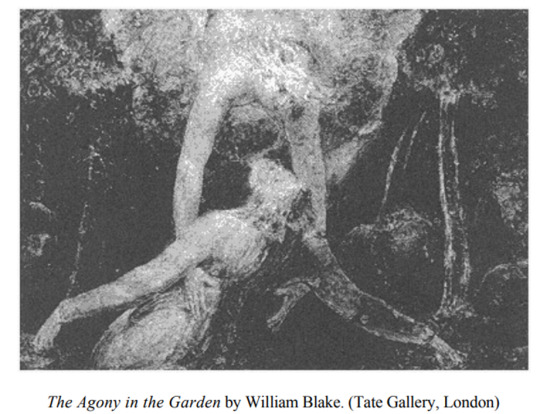
These situations, whether in analysis or in life, or both, can raise profound religious questions. Is this God confronting me? Was I on the wrong track? Am I being forcibly turned around? Is there some almighty plan that is different from mine? Am I being forced to submit? Should I accept Fate? Do I, in fact, have any free will? Is this God burning away the veils of illusion, or am I facing the devil? Is he making one last stand to cheat me out of my own life?
Psychologically, the questions are equally blistering. Is this the Self demanding a sacrifice? Or is this the real face of the complex that has crippled me all my life? Just when I thought I could be free, there it is to destroy me. Everything I have fought so hard to bring to consciousness is now in question. Why do I suddenly wake up every night at the same time? Why do I feel this searing pain? Why are my hands so weak? Am I really alone? I'm worse off now than I ever was. I'm back in the old pattern. I'm back in the matrix—back in the Garden recognizing the place for the first time. Is this who I really am? Is this who I have been running away from all my life?
Psychologically, the ego, like Lear, Job and Jesus, is penetrating and being penetrated by the archetypal Ground of Being in an effort to bring to consciousness whatever it can of that vast unknown. It experiences another law operating from within, a dawning realization that it has a destiny of its own which must be obeyed. It knows that something new is being born; it has to breathe into the pain and let it be.
Many people in our culture are attempting to suffer these transformations alone, without any ritual container and without any group to support the influx of transcendent power. Like Eliot's Magi, they experience the birth as "hard and bitter agony . . . like Death, our death." They are "no longer at ease here, in the old dispensation,/With an alien people clutching their gods."
Without the container and without the group, the aloneness is almost intolerable. The individual ego has to be strong enough to build its own chrysalis in order to create a loving communication with its own inner symbols. Their numinosity brings the confidence and integrity, humor and illumination without which the ego could not survive, let alone expand. A childish ego, primitive and unconscious, cannot maintain a living chrysalis; it wants to project everything, and, tuned to a natural order, it explains what happens by magic. The chrysalis becomes too precious in itself, shellacked with sentimentality. A childlike ego can hold the tension, pull in the projections and ponder the inner mystery. At the transpersonal level, the symbols are simultaneously individual and universal. At that level, none of us is alone. New relationships, bypassing the world of transitory disguise, begin at that depth, and from there relate back to the world in a totally new way.
Hours before he died, Thomas Merton, author of The Seven Storey Mountain, gave a lecture which concluded with a plea for openness to the "painfulness of inner change":
What is essential... is not embedded in buildings, is not embedded in clothing, is not necessarily embedded even in a rule. It is somewhere along the line of something deeper than a rule. It is concerned with this business of total inner transformation.
According to his own account, Merton completed his inner transformation on his Asian journey standing barefoot in the presence of the giant Buddhas of Polonnaruwa in Ceylon. "I know and have seen what I was obscurely looking for," he wrote. "I don't know what else remains but I have now seen and have pierced through the surface and have got beyond the shadow and the disguise."
When Merton asked a Buddhist abbot, "What is the 'knowledge of freedom'?" the abbot replied, "One must ascend all the steps, but then when there are no more steps one must make the leap. Knowledge of freedom is the knowledge, the experience, of this leap."
Voices from the Chrysalis
It's hard for me to trust life. I like to take hold of it, grab it by the neck and put my teeth into it, just to be sure it doesn't get away on me.
I try to see how far I've come, rather than how far I have to go.
Now that I'm contacting my own inner clock, I am so slow. My life is on top of me. The collision of values overwhelms me. Am I wasting my time? I don't know.... I don't know.... this terrible aloneness.
I've always identified with what I'm not. But who am I? My guilt and shame and fear are making me human.
I was always waiting until all the responsibilities were completed, then there would be time for me. How? I never thought about that. I've been so busy doing, I've missed something very important to me. I don't think I was ever a child. I have no recollection at all of being a very young child with any sense of being ME.
I wonder if it takes a holocaust, outer or inner, to help us to realize what is really essential in life.
I lived a smileandgrin, smileandgrin existence. I was dying.
I rage for life. I want so much to be free.
I'm trying to have faith—faith that I will be born.
I'm so off balance. I pray for daily guidance to avoid tripping over things. I can go to sleep when I orient myself to the stars.
The spirit is in the volcano inside. My relationships aren't very good right now, so I go back to work. I'm safe there. But even that isn't perfect.
I'll explode if I have to react to one more thing. I'm pulling back. I'm overwhelmed by the pressures of the outside world and the mounting pressures of the interior world are making me feel actually sick.
Used to feel capable, used to speak and write well. Now I never feel secure because I can't find words.
Am I fighting my destiny or does my destiny require I take a stand?
When I touch into that essence and recognize myself as what I've been running away from, I am humbled.
I'm Miss Compassion, Miss Humanity. I'm a missing piece. I'm also a child of God.
To get rid of one's past one has to forgive—confront and forgive—and move into the present. Forgive oneself too, and God.
I hated my father. I imitated hated myself.

--Marion Woodman en "The pregnant virgin"
#emily dickinson#william blake#carl jung#freud#psychology#archetype#the pregnant virgin#marion woodman#Marie-Louise von Franz#rainer maria rilke#lear#Job#jesus christ#T.S. Eliot#journey of the magi#thomas merton#the seven storey mountain
7 notes
·
View notes
Text

Bammie Zoells is one of the leading international models today, known not only for her stunning beauty but also for her incredible ability to seamlessly transition between various styles with naturalness and elegance. She is a true fashion chameleon, capable of embodying and reinventing any look, whether it’s a classic and sophisticated style or something more daring and contemporary. Her versatility makes her an indispensable figure on runways and in fashion editorials around the world.
INTERVIEW
How did you get to know the metaverse?
answer : Metaverse is an integrated and immersive virtual world concept, where people can interact, work, play, and perform various digital activities through their avatars. I've known metaverse through several ways since the pandemic. This situation has accelerated the adoption of digital technology and virtual interaction, which in turn raises interest in metaverse. Indirectly, I use this sims community as a means of expanding the metaverse I use. I have a lot of friends from abroad, even one country with me joining this metaverse the sims community.
What are your main occupations here?
answer : My current profession is modeling at a prominent agency. A model isn't just a walking shirt. They are artists who use their bodies as canvas, expressing the vision of designers and photographers through poses, expressions, and body movements. Every step on the catwalk is the result of countless hours of practice. Every perfect photo is the fruit of dozens, even hundreds of prints. In this digital age, the profession of modeling is growing. Not only on the fashion stage or in magazines, now models are also flooding the world of social media and e-commerce. The ability to promote products online becomes as important a skill as posing in front of the camera.Nevertheless, a career as a model is often short-lived. Trends change, new faces emerge. As a result, many models start thinking about long-term careers early on, either in the fashion industry as designers or managers, or in other areas that leverage their networking and experience.
Do you have any projects for the future?
answer : As a model, I have some plans for the future aimed at continuing to develop myself and contributing positively to this industry. First of all, I'd like to explore a variety of collaborative opportunities with photographers, designers, and brands that have the same vision. It will not only help me build a more diverse portfolio but also expand my professional network. Besides, I plan to keep learning about the latest trends in fashion and beauty. By following this development, I can remain relevant and give a fresh appearance at any shooting or performance. I also want to invest in training, like acting classes or speaking in public, to expand my skills and open up possibilities in the entertainment industry.
Talk about relationships and friends you've built here!
answer : During my time here, I've built meaningful relationships with my friends and colleagues. Each interaction brings a unique experience that increasingly enriches my life. This relationship is not only limited to professional aspects, but also establishes a strong personal bond. Besides, I also believe that good friendship can drive personal growth. Many of my friends have different backgrounds and expertise, and through our discussions, I can see new perspectives and learn a lot of new things. It not only broadened my insight, but also helped me become a better individual in many respects.I also very much appreciate the community that has been formed around me. We often collaborate on projects, share ideas, and encourage each other to reach our best potential. There's a strong sense of mutual trust, where we give each other constructive feedback and help each other in achieving a goal. Overall, the relationship I've built here means a lot to me. They've provided support, inspiration, and comfort on this journey. I look forward to continuing to deepen this bond of friendship and creating more beautiful memories in the future. Every day, I realize how important it is to have people who support and encourage us to be the best version of ourselves.
Leave a message for your friends and admirers!
answer : To all my friends and fans who have supported me, I would like to express my greatest gratitude. Your support all this time has been an incredible source of motivation and inspiration for me. Every message, comment, and speech of enthusiasm that I receive is meaningful and makes me feel not alone on this journey. I want you to know that this journey is not just about individual achievements, but also about the communities we build together. You have been part of every step I take, and that makes all the sacrifices and efforts very valuable. I hope what I'm doing can inspire and help you believe in your own potential. I also want to remind you to always take care of your mental health and self-happiness. We all face difficulties, and it's important to talk about feelings and seek support when needed. Together, we can create a positive and mutually supportive environment.



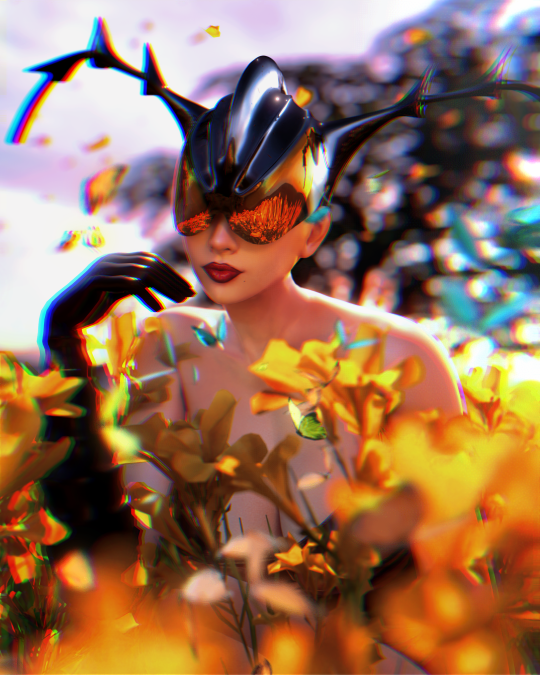
2 notes
·
View notes
Text
Staying the Course: The Power of Patience in the World of Bitcoin

In the ever-evolving landscape of Bitcoin, it's easy to get caught up in the daily price action. Whether it's soaring to new highs or dipping into the red, Bitcoin's volatility is something that can test even the most seasoned of investors. But what happens when the price movement is more... sideways?
For me, staying the course has always been about the long-term vision. Bitcoin isn't just a short-term play—it's a strategy for building lasting wealth and financial freedom. No matter what the market is doing today, tomorrow, or next month, my approach remains the same: stack SATs, and keep stacking. This is the strategy. It’s simple, yet powerful, and it’s what keeps me grounded during these times of uncertainty.
Learning from History
History has shown us that Bitcoin often moves in cycles. Consider the periods in 2013, 2016, and even as recently as 2020. During these times, Bitcoin seemed to be moving sideways, causing doubt among some investors. However, each of these periods was followed by significant price surges that rewarded those who held on. For example, after the 2016 halving, Bitcoin’s price remained relatively stable for months, only to skyrocket in 2017. This pattern is a reminder that periods of quiet can be a precursor to something much bigger.
The Power of Patience
This strategy works because Bitcoin has shown time and time again that it rewards patience. Looking back at its history, we see a pattern: after periods of sideways movement, Bitcoin often experiences significant upward momentum. Those who have held strong through the lulls have been rewarded for their resilience. It’s not just about timing the market; it’s about time in the market.
This mindset requires discipline, especially when the market seems stagnant. It's easy to feel discouraged when Bitcoin isn't making headlines or breaking records. But it's during these quiet times that the real progress is being made. Behind the scenes, development continues, adoption grows, and the foundations of the future financial system are being laid.
The Psychology of Staying the Course
Emotionally, sticking with your plan when the market feels flat can be challenging. The constant noise from skeptics, the temptation to shift focus, and the impatience that naturally arises can all test your resolve. This is where understanding the psychology of investing becomes crucial. Fear, Uncertainty, and Doubt (FUD) are ever-present in the world of Bitcoin, often amplified during periods of sideways movement. However, recognizing these emotions and managing them is key to maintaining a long-term perspective. One way to combat FUD is to focus on the fundamentals of Bitcoin—its decentralization, scarcity, and growing adoption.
But that's when it's most important to remember your reasons for investing in Bitcoin in the first place. For me, it's about more than just price—it's about being part of a financial revolution, one that I believe will reshape the world.
A Long-Term Play
Comparing Bitcoin to traditional investments like stocks, real estate, or gold, we see a similar principle at work: long-term investing typically yields the best results. However, Bitcoin stands out because of its unique properties—its finite supply, resistance to censorship, and ability to transfer value globally with ease. These qualities make Bitcoin not just an investment, but a form of insurance against the uncertainties of the traditional financial system.
Looking Ahead
As the market moves sideways, I’ll continue to stay the course, confident in the knowledge that patience, persistence, and a long-term perspective are the keys to success in the world of Bitcoin. With upcoming technological advancements, increasing institutional adoption, and the potential for regulatory clarity, the future looks bright. The quiet periods, like the one we’re in now, are merely the calm before the next wave of innovation and growth.
So, as the market moves sideways, I’ll continue to stay the course, confident in the knowledge that patience, persistence, and a long-term perspective are the keys to success in the world of Bitcoin.
Take Action Towards Financial Independence
If this article has sparked your interest in the transformative potential of Bitcoin, there's so much more to explore! Dive deeper into the world of financial independence and revolutionize your understanding of money by following my blog and subscribing to my YouTube channel.
🌐 Blog: Unplugged Financial Blog Stay updated with insightful articles, detailed analyses, and practical advice on navigating the evolving financial landscape. Learn about the history of money, the flaws in our current financial systems, and how Bitcoin can offer a path to a more secure and independent financial future.
📺 YouTube Channel: Unplugged Financial Subscribe to our YouTube channel for engaging video content that breaks down complex financial topics into easy-to-understand segments. From in-depth discussions on monetary policies to the latest trends in cryptocurrency, our videos will equip you with the knowledge you need to make informed financial decisions.
👍 Like, subscribe, and hit the notification bell to stay updated with our latest content. Whether you're a seasoned investor, a curious newcomer, or someone concerned about the future of your financial health, our community is here to support you on your journey to financial independence.
Support the Cause
If you enjoyed what you read and believe in the mission of spreading awareness about Bitcoin, I would greatly appreciate your support. Every little bit helps keep the content going and allows me to continue educating others about the future of finance.
Donate Bitcoin: bc1qpn98s4gtlvy686jne0sr8ccvfaxz646kk2tl8lu38zz4dvyyvflqgddylk
Thank you for your support!
#Bitcoin#Crypto#Cryptocurrency#Investing#FinancialFreedom#Blockchain#LongTermInvesting#StayTheCourse#BitcoinStrategy#HODL#SidewaysMarket#MarketTrends#DigitalCurrency#BitcoinCommunity#PatiencePays#financial experts#unplugged financial#globaleconomy#financial empowerment#financial education#finance
4 notes
·
View notes
Text
Product and Artist Management class
My journey in this course has been transformative. Here are the key takeaways:
Understanding Course Material:
The course has deepened my understanding of key industry concepts. For example, I learned about BATNA (Best Alternative to a Negotiated Agreement) and its critical role in negotiations. By analyzing real-world scenarios, I was able to see the practical applications of this concept.
I explored the impact of audience media consumption habits on the industry, leveraging Nielsen articles to substantiate my claims. This research highlighted the dynamic nature of audience preferences and their implications for media strategies.
Personal Growth:
Through various assignments, I discovered my strengths in creative thinking and strategic planning. The project on developing products for 'NOZ N' CHAOS' festival allowed me to blend creativity with market research, resulting in well-rounded products that cater to the target audience.
My ability to conduct thorough research and apply it effectively was tested and refined. For instance, while working on the talent management agencies assignment, I utilized multiple sources to create a comprehensive and visually appealing infographic.
Challenges and Solutions:
One significant challenge was balancing creative ideas with practical feasibility. To overcome this, I employed a structured approach to brainstorming and evaluation, ensuring each idea was both innovative and implementable.
Another challenge was staying current with industry trends. I tackled this by regularly engaging with updated resources and articles, ensuring my knowledge remained relevant and up-to-date.
Research and APA Style Citations: While this project is primarily reflective, I incorporated several academic and industry sources to support my insights. For example, I referenced two Nielsen articles to discuss audience media consumption habits. All sources are cited in APA style, ensuring academic rigor and credibility.
Professionalism: This assignment is presented in an organized and professional manner. The narrative flows logically, with clear transitions between thoughts. The document is free of spelling, grammar, and formatting errors. The Tumblr post link is included below and is active, providing direct access to the post.
Conclusion: This course has been an incredible learning experience, equipping me with valuable knowledge and skills. I am excited to apply these lessons in my future endeavors and continue growing both personally and professionally.
2 notes
·
View notes
Text
OOC - House Cress and the streisand effect
I want to emphasize that this is my final post on this subject. I have no interest in dwelling on the past, but I will briefly reflect on it. Apologies for the length of this post. While there is a lot more that I feel should be addressed, it does not relate to House Cress and the claims surrounding it.
That being said:
Integrity: the quality of being honest and having strong moral principles; moral uprightness.
it is important to note that my integrity is not the sole defining characteristic of my identity. While it holds significant value to me, I continuously work on refining and perfecting this aspect of my being. Through various life experiences, including both successes and failures, I have undergone personal growth and development. I have learned the importance of taking responsibility for my actions and holding myself accountable, even in the face of adversity.
One pivotal period in my life that greatly contributed to this transformation was my nine-year tenure as a Montessori teacher. During this time, I dedicated myself to instilling a set of core values in my students. I emphasized the importance of kindness, honesty, authenticity, and respect. By cultivating this mantra, I aimed to empower my students to embrace these principles and integrate them into their own lives.
Be kind Be honest Be yourself Be respectful The four 'b's have become an integral part of my approach in my current position as the director of a school catering to children with disabilities, focusing on early learning and Montessori education. Our school's mission revolves around reshaping perceptions of disabilities on a global scale. I would not be in the position that I'm in now if I failed to possess strong core values. I, like many others, have slipped or regressed in their healing, as healing is never linear. Emotions such as frustration, hurt, anger, and upset are natural reactions, however, what truly defines us is not the emotions we experience, but rather how we choose to respond to these challenging circumstances. The focus of my address will be on examining the credibility and reliability of the claims made in relation to House Cress. I speak now to you, the author of these 'PSA's.
The development of House Cress and all its components, such as the heirlooms they adorn (the bells, of which you said was not going to be in use in this AU specifically on your end, as you made a point in saying your character wears something else. I opted to stick to the original concept as those very bells are a part of me, by way of being tattooed on my body), the rich history of the house, the darker elements of their lineage, the catacombs, and the patricide of the father figures, among other details, has been a result of my cultivation ever since you abruptly departed from the original narrative in 2013. Despite the fact that many individuals have created a Cress character, some of whom I am still in touch with while others I am not, none of them have gone to the extent of discrediting its origins like you have.
There are active members in this community who have seen or have been a part of House Cress long after you 86d me, who can attest to what I'm claiming. (Some links not provided on account of them not having Tumblr.) @thefreelanceangel @sihdiel @an-impass @bosslyrralith @sigridderioslainn @v-xv @gereidyn.tumblr.com @lilac-memorials.tumblr.com @ Moonstrewn (Becki) @papa-murphy (Dragonreach) @ Wasabipie (Dutchy of Summerfast) @Caha /HEMHEM
In closing:
You were the only one who took it upon yourself to delete a year and a half's worth of my contributions without any prior notice. Furthermore, you even combed through our direct messages on Discord and erased every single message that you had sent. As I mentioned in my previous post regarding this specific matter, you went ahead and eliminated all the incriminating statements that you had made. This, in my opinion, speaks volumes about your character and integrity. Moreover, the fact that you have resumed communication with someone whom you have personally witnessed causing me an immense amount of trauma is also a testament to your integrity.
Re-establishing a connection with an individual who has been the source of years of trauma is not only abhorrent but also disheartening. Over the years, I have refrained from reaching out to those who have caused you harm, and you are aware of two specific individuals I am mentioning, one of which you've opened the doors for again. This is now the second instance where you have taken the initiative to contact them, seemingly with the purpose of aligning yourself with a group of individuals you can gossip with about me. During our last phone conversation in January, I made reference to the fact that the individual in question is akin to the person who brought about years of turmoil and harm in your life. You are well aware of the pain and suffering this individual has inflicted upon me.
While it is within your rights to associate with whomever you choose, this action further solidifies my belief that you never truly cared about me. Even in moments of intense anger towards you, I never once considered causing you indirect harm by associating with individuals who have been known to hurt you, nor have I been tempted. It is of no concern to me which character you choose to portray. It is irrelevant to me which traits you decide to incorporate into your character. What truly matters to me is the absence of honesty when it comes to the material you are drawing inspiration from. What truly matters to me is the criticism that is directed towards me through your words.
I acknowledge that I am not flawless, and I do not assert otherwise. Throughout my life, I have never utilized my past trauma or personal experiences as a justification for mistreating others. I have consistently strived to effectively communicate my mental state, articulate my needs, and provide reasons for any delays in responding to messages on Discord or in document roleplay scenarios.
Despite the negative emotions I have towards this situation and the events that led to it, I cannot deny that I considered you as part of my family. I held you in high esteem and genuinely cared not just for you, but for your entire family as well.
I have made a conscious decision to release the pain and resentment I feel towards you. Through this post, I am choosing to let go of all the hurtful feelings. Throughout the 16 years of our choppy friendship, my only desire has been to see you happy, and this sentiment has remained constant since our initial connection in 2009 until now in 2024.
I have made the choice to adopt a positive outlook and focus on my own writing and to continue the journey of House Cress in this universe, as well as many others. I am resolute in not being pacified or having my reputation sullied by false accusations. I've zero quandary with falling on swords, I will hold myself accountable but I will also advocate for myself. I will continue to do as I've been doing, and I encourage you to continue to do the same. Refrain from resuscitating that which has already lost its vitality. I am not a part of your reality, just as you are absent from mine.
I kindly request that you leave me alone. We can coexist as that was always the plan, but rest assured, we will never be in contact again. Four other times I've opened my doors to you and four times I've been burned by these unceremonious removals from your sphere. Never again will I put myself in that situation. Never again will I be the target of your ire, or the jealousy of those who you call 'best friend'.
If by chance you do come across me, it will be purely coincidental. I wish you nothing but the best. Formally yours, -O.
5 notes
·
View notes
Text
it’s been a crazy week for us! last thursday ambrosia had a vet appt to address the fluid filled masses which have developed on her elbows (pic below). the vet said they are likely hygromas, and form as a result of laying repeatedly on hard surfaces. she drained the larger one and instructed me to get softer bedding for her. i did as much, but just a few days later the hygroma came back to full size. i was recommended padded elbow compre sleeves for her, but they are very expensive so i am waiting to hear back from the vet with more information

as far as training goes, she continues to be one of the most enthusiastic dogs at puppy class! last week, we worked on “leave it” and “drop it,” which she does so well in a set up training scenario, but she is definitely struggling to apply those skills to real life still
as far as other aspects of our life- i had an insanely busy weekend, which unfortunately meant i didn’t get to spend that much time with brosia. she stayed with my mother and with my partner, mostly, but also with a friend of mine for an event on saturday evening. they all said she behaved really well, and has been sleeping a lot. i wonder if she has another growth spurt coming- she was 40 pounds at the vet last week!

3 notes
·
View notes
Note
dont know if you been asked this but i am curious
would you genuinely consider sdra2 a bad fangan/story?like what rating would you exactly give it if you can,what are the major positives and negatives in your eyes?
//I don't think SDRA2's a bad fangan, it's just a deeply flawed one. I know I complain about it a lot, and that's because LINUJ is capable of great writing. He just has this weird habit of undercutting his work for inexplicable reasons ^^;
//As for the big pros and cons of SDRA2 in my opinion?
+ Overall, the cast, at least for the first two chapters, is pretty solid and I like their dynamics. They're all pretty well-written and nobody feels flat + I like how this game utilizes the Neo World Program as more than just a setting, but integrates its mechanics into the plot as well + The decision to reveal Mikado as the mastermind from the very beginning was a good one, allowing us to get to know him as this theatrical villain through the whole game + Having essentially four traitors in the group was also an interesting idea and changed up the dynamic + The character drama concerning Sora and Yuki, especially in Chapter 5, is really well done, especially with how it connects back to the first game + I really enjoyed Hibiki's character growth in the first half of the game + Sora and Yoruko's relationship is fantastic + Having the characters from Chapter 6.5 of DRA really feels like it has a nice bit of continuity to things
-Even if it had some different elements, I personally would've enjoyed it better if the Another games didn't keep following up the canon ones with the exact same setting ideas, going from Hope's Peak to an island -The game doesn't have a solid theme. It's supposed to be about Progress vs. Result, but this is only apparent through dialogue, rather than made clear through the actual narrative and events of the story. Actually trying to follow the story's events to find a cohesive theme will just leave you floundering. -Most of the cast unfortunately feels superfluous, as the story is mostly centered on the Voids and Utsuro. Hibiki sadly gets the worst of it there, where her story feels less like a tragedy and more like a meaningless death for the sake of having a shocking twist -Chapters 3, 4, and 6 are very weak compared to the rest of the game. One is almost completely irrelevant to the actual story, one was rewritten to avoid being too similar to another fangan and one is stuffed to the gills with exposition and infodumps because of the latter two. - Kanade. She's overrated, poorly-written shock bait, and the more you go back and re-experience the story of SDRA2, the more you can see how pointless she really is as a character. She either shouldn't be there at all or Chapter 3 should've been rewritten to actually have her expose one of the Voids. That might actually convince me that she's supposed to be smart -While I understand why it happens, a lot of the characters get far too mean, bitter, argumentative or villainous for me to get invested. Iroha is basically useless, does nothing but cry and whine and depend on others, and yet survives to the end without a drop of character development. Kokoro honestly gets the worst of it in Chapter 0, to the point that it feels borderline ableist to me. -The Sixth Trial feels like it veers off too much into "Yes, but" territory, where we constantly cycle between problem and solution, and it gets really repetitive. Having Sora win thanks to having Divine Luck at least doesn't feel like too much of a cop out, given that it's literally the focal point of the story, but it still felt like things were drawn out too long and there was too little foreshadowing on a lot of elements for them not to feel like they came out of left field. -LINUJ's weird insistence with undercutting the emotional core of many of the characters' arcs, which you can see especially in the character profiles and blog posts. It feels like a bad cast of telling and not showing, where he tells us that we shouldn't feel sympathy for people like the Voids, that people like Syobai never change and that Kanade's entire personality revolves around her sister. All of it undermines the actual story if you read them. -Sora keeps sisterzoning Yoruko and I have no idea why
11 notes
·
View notes
Text
The Gym Beginner's Tip No One Will Tell You About
I’ll tell you all something that no other personal trainer in the fitness industry will tell you. It’s nothing new, and all trainers and instructors know this very well. The only reason you’ll never hear a trainer mention this publicly is because they will miss out on potential money by sharing this information with you. Before I share this information, I’ll give you my own credentials so you know I’m not just pulling your leg (although I’m certain most of you will already know this information intuitively).
If you’re new here, hello! My name is Aleena! I’m a NASM Certified personal trainer, and I’ve been working in the fitness industry for nearly three years now. That’s not a terribly long time, however I’ve experienced massive growth and success in my career since I’ve began as a personal trainer. First a trainer then a class instructor and eight months later I was gifted with the opportunity to become a fitness manager. I work for a boutique gym located in Downtown Los Angeles and the entire premise of my job is help the other trainers in my facility grow in their own training abilities. Beyond my career, I’ve been active my whole life. I ran track in elementary school, played basketball throughout middle school and high school, and was an active gym rat in college continuing on. When COVID struck and we all went into quarantine, I became a yoga nut and runner, and you can most certainly bet as soon as gyms opened up I found myself right back in there. Post-COVID I got my first ever personal trainer and quickly realized how easily I could translate the information I had learned throughout my life to help others in their own health and fitness journeys. A few months later I was certified and ready to start building in my profession. The growth has been unreal, but I feel it’s a deep indication of how I have found the path that is right for me.
So what is it that other personal trainers won’t tell you?
You don’t NEED a personal trainer. Sure, that sounds normal and understandable, so let me clarify with more information.
You don’t need a personal trainer for the FIRST THREE MONTHS of your fitness journey.
It’s a fairly intuitive understanding, but most of us will get scared to do something new on our own. The reason I say the first three months is because, if you’ve never done anything fitness related or it’s simply been a long time since you’ve been active, the first three months should be dedicated to getting into the habit of becoming active. If we’ve been sedentary for a long time, quite literally any consistent movement will yield results.
I like to explain it like this - if you pick up a weight and you move the weight in some way and you do this everyday for 90 days, you will see a change. It doesn’t matter what you do with this weight. You can pull it, press it, raise it, walk with it. Just do it every single day for 90 days and watch how something will change. Now… it may not be the change you want to see, but there will be change. This is something we all know, and yet no trainer is going to tell you this. Instead (as an unfortunate result of the capitalistic nature of our society) they’ll try to sell you on the idea that you have absolutely no clue what you’re doing and you need a trainer’s guidance in order to make change happen.
Here’s my issue with that - most people know what they want, but they don’t have specific and fully developed fitness goals. I can’t tell you the number of times I’ve sat down with a beginner client and asked what their goals are and the answer I get in return is something along the lines of “I want to lose 20 pounds” or “I want to tone up.” In turn I’d have to get specific with them by asking what movements they want to learn, what modalities they do and don’t enjoy, what amount of time they are realistically able to dedicate to their fitness, and so on and so forth. My job is to be a trainer, and I actually do enjoy having these conversations with people, but there’s room for error when we start from ground zero together.
Firstly, and I say this with absolute conviction, your only friend in the gym should not be your trainer. Community at the gym is proven way to keep people motivated and interested in their fitness. People will stay at the same gym, even when the equipment is falling apart, the AC is leaking or broken, or the staff is terrible, because of the people they see at the gym. People also find more motivation to show up to the gym when they know their friends or their gym crush is going to be there. You should establish some semblance of a gym community before you start working with a trainer. Secondly, shoveling money out of your pocket will definitely weigh you down in the hopes of seeing results. Generally when we pay for something, we look for instant gratification (we can again blame capitalism and rampant consumerism for this). Fitness never has been and never will be a source of instant gratification. In order to trust the process, avoid paying the big bucks up front and instead see what you can and can’t do on your own. Show yourself that the change is possible first, before you begin to invest in a trainer, that the way when you’re paying for a trainer’s guidance you already know that it’s well worth it because you know the results will come cause you’ve already seen how consistency on your own made change. Thirdly, these initial 90 days that you spend working out on your own will be the source of inspiration. You will get to spend time in a gym, or just moving your body and trying to learn more on your own. This gives you the time to become specific with what it is you want to do. It’s day 1 in the gym and you have no idea what a deadlift is, but now it’s day 90 in the gym and you’ve seen the same girl deadlifting since day 1, so you did your research and now you a specified goal to take to the trainer you end up working with. Specified goals will also help you when trying to select a trainer. Every trainer can teach you how to deadlift, but a barbell technique specific trainer is going to teach you the sport of the deadlift. You wouldn’t ask a math teacher to help you write an english essay, and same applies here. You wouldn’t ask a body building coach to teach you athleticism and mobility. You wouldn’t as a powerlifting coach to teach you how to become absolutely shredded. Become specific, and the path will become obvious.
I’ve given you my three reasons as to why I believe people should start their fitness journeys on their own.
I’ll also share with you the exceptions I have to this belief.
First, if you struggle with discipline or motivation, this will not work for you. If this is the case, I recommend looking for a coach, not a trainer. You may be thinking… what’s the difference. There’s a huge difference. A trainer will tell you what to do when to do it, they’ll show you how to do things correctly and they’ll send you on your merry way. A coach will do all of those things, but they’ll also help you build sustainable habits, they’ll help you push past your limiting beliefs, they’ll hold you accountable and do check-ins with you, they’ll make appropriate adjustments to your program without you having to say anything, they will monitor ver closely, your journey and course correct if something is not lining up with the path. Second, if you’ve had multiple failed starts to your fitness journey, I also believe looking for a coach will benefit you for the same reasons above. You may already have some knowledge around fitness, or you may have been very active back in the day, but again - the struggle is consistency and accountability. A coach is meant to be an accountability partner, it goes deeper than teaching someone the movements, it’s about reworking the brain’s chemistry associated with fitness.
If you don’t fall into either of these exception categories, then to you I say, pick up a weight and start moving it. We’ll talk in 90 days!
#fitness#gymgirl#health#athleticism#gym#gym beginner#gym beginner tips#health tips#wellness tips#fitness tips#gym motivation#gym reminders#gym body#gym life#personal trainer#personal training#fitness training#fitness trainers
2 notes
·
View notes